 12/03/2008 11:38 12/03/2008 11:38 |
|
| | | OFFLINE | | Post: 12.329 | Registrato il: 28/08/2005
| Utente Gold | |
|
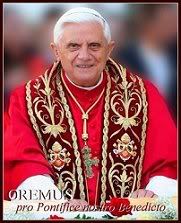 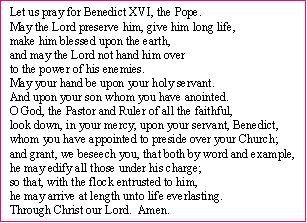
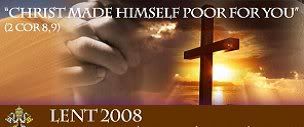 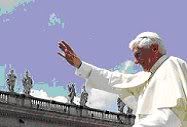  THE GALILEO CASE:
THE GALILEO CASE:
The dispute was theological,
not scientific
By Franco Cardini
Translated from
L'Eco di Bergamo, 3/11/08
Editor's introduction: Next year, a statue of Galileo will be erected in the Vatican Gardens. Galileo was the fuse that lit the controversy over the visit of Benedict XVI to La Sapienza University in Rome. As we know, the Pope had to cancel that visit.
Historian Franco Cardini in the following analysis of that controversy stigmatizes the errors that have been prevalent about 'the Galileo case.'
It's very difficult, if not impossible, to take seriously the 'scandal' created recently by some diehard souls - who have vowed priestly fidelity to the venerable 19th-century altars of Science and Progress - who claim that the Pope profanes these altars.
That Temple of Reason and Modernity which La Sapienza now purports to be would have been violated by the sacrilegious presence of nothing less than the head of all Catholics, those obscurantists!
As we now know, there were really just less than a hundred scientists [abetted, alas, by the considerable weight of media attention, if not encouragement] who raised all that racket to prevent the Bishop of Rome from visiting the oldest university in his city.
Let us not even ask what burning accusations of intolerance would have been raised indignantly against those dissidents if they had tried to prevent the visit of an imam or a rabbi the way they did the Pope's.
But we must point out that in the Pope's case, we saw once again the operation of a mechanism we are familiar with - namely, that in an age of universal tolerance and political correctness, the only prejudice that is considered legitimate and acceptable is that against the Catholic Church.
In this view, any believer is worthy of respect - except Catholics, because Catholicism, the liberals claim, violates the sacrosanct principles of secularity in the civilian world.
But if one wanted to know more and look into the concrete reason for such ostracism, the response is immediate and paradigmatic. 'The Galileo case', for which the Church has never made sincere and honorable amends, in the view of Church critics.
Indeed, Galileo was directly invoked by the Sapienza dissidents, as though Benedict XVI's visit would have been equivalent to a perverse return to Aristotelianism and geocentrism.
Notwithstanding the reiterated, consistent and conclusive declarations of faith in modern science and the good that its positive applications has meant for mankind from John XXIII, Paul VI, John Paul II and the present Pope himself.
No, the dissidents ignore all of that. Just as they ignore that the Faculty of Medicine of the Catholic University in Rome has a research center that is one of the most prestigious. This alone would suffice to show the effective relationship between the Church and modern scientific advances, beyond the legitimate dialog between science and faith, in which each is autonomous in its own field.
Galileo himself said that such a dialog is guaranteed to Christians by the Creator himself, who revealed the Truth both in Scriptures as well as in Nature, and that there is only one Truth which cannot be denied, no matter how difficult it is for man to penetrate its authentic sense.
And yet, the errors swirling about Galileo continue - because no one is as deaf as he who refuses to listen.
In 1563, at the time of the celebrated trial that led to Galileo's forced renunciation of his scientific theories about the earth, the then-69-year-old Florentine scientist saw his work contradicted not only by the authorities of the Holy Office but by the whole scientific establishment of his time.
The Lutheran professors of the University of Tuebingen, fierce anti-Papists all, toasted joyously when hearing the verdict on Galileo. The scientific community then, although internally ridden with fierce political and religious rivalries, was on the whole rock-solid in its Aristotelian and Ptolemaic geocentrism, according to which the earth was the unmoving center of the universe, with the sun moving around it.
Copernicus's theory of heliocentrism, which Galileo's studies and discoveries confirmed, would become accepted science only much later - and in its turn, his theories would be replaced, because they rested on many wrong premises - after more precise and correct studies by Kepler and Newton.
It must be noted, however, that the entire question of 'the Galileo case' as liberal ideologues would have it today - thanks to the simplification by Bertholt Brecht who reduced it to the convenient scheme of a duel between freedom and repression, between science and superstition - continues to present many historical problems.
In 1683, Pietro Redondi published a study which claimed that the Galilean work that had led to his trial by the Inquisition - Il Saggiatore, published in 1623 (how it obtained an imprimatur from the Church, to begin with, is not entirely clear) - was not condemned because of heliocentrism, but rather for its atomistic implications which, insofar as it impacted on the inner structure of matter, would have risked leading to a heretical approach to the doctrine of transubstantiation, thus placing into question the Eucharistic mystery itself.
Other studies have shown that the verdict against Galileo also came about due to other concrete factors having to do, not so much with the substance of his theories but with the statements he made in its defense - considered by some ambiguous, by others too presumptuous.
The fact remains, nevertheless, that both heliocentrism and atomism, although not yet accepted at the time, neither by the Church nor by the scientific establishment which was still Aristotelian, were also supported by some scientists who were professed Catholics - for instance, Pierre Gassendi (1592-1655) - but who were never called to question by the Church.
Galileo, however - a disciplined and devout Catholic - was destined to become an icon of modern times, as the martyr of free thought, along with Giordano Bruno and Tommaso Campanella, both of whom
suffered a fate much worse than him. [They were burned at the stake.]
It was as this icon that he was cited not only by the student dissenters at La Sapienza, who are apparently ignorant of many facts about the Galileo case, but even by the professors who started it all, to begin with, and whom, certainly, one expected to be more knowledgeable than the students. In their case, it is really their intellectual honesty that is more questionable, rather than what they objectively knew.
In short, this has been the usual foul play against the Church.
The Catholic Church, not unlike other institutions at the time, held to theories that were universally considered and shared then to be scientifically correct, eventually changing its position only with caution and slowly, as institutions generally do when coping with fundamental changes. But only with the Church does this become a sin, which in other institutions is considered a totally normal process.
Similarly, every now and then, someone brings up the charge that "the Catholic Church burned witches". And yet, the Calvinists objectively burned many more women for being witches. Also, in the 16h and 1t7h centuries, belief in witchery and magic was common among many thinkers and scientists.
One of the fiercest witch burners was a great judge, Jean Bodin of France, who was one of the founders of the theory of the modern state. Yet neither the very secular French state nor its association of jurists has ever apologized for what everyone now considers to be crimes of superstition. Bodin continues to be unsullied as the immortal author of the treatise De la republique; John Calvin continues to be celebrated for his fearless morality; and the Roman Church remains the only 'culprit' named as the principal executioner of women burned at the stake.
And that is the constant demagogic and calumnious use of the past by liberals. Invoking historical evils - which often are effects rather than causes - is SOP in a well-oiled mechanism of denigration against the Church by intellectual dilletantes and political agitators who end up being legitimized by 'authoritative' support from liberal intellectuals and the media.
Eco di Bergamo, 11 marzo 2008
[Modificato da TERESA BENEDETTA 16/03/2008 05:30] |
|
 12/03/2008 12:44 12/03/2008 12:44 |
|
| | | OFFLINE | | Post: 12.335 | Registrato il: 28/08/2005
| Utente Gold | |
|
THE GENERAL AUDIENCE TODAY
Today I wish to speak to you about two great Christian writers from the Italian peninsula during the period after the fall of the Roman Empire in the West: Boethius and Cassiodorus.
Both were anxious to preserve the heritage of Greek and Roman learning, handed down through generations of Christian believers, in the context of the Gothic culture that dominated Italy at the time.
Boethius, born in Rome in 480, entered public life and became a senator, though he continued his philosophical and religious studies alongside his public responsibilities. Unjustly imprisoned and later executed by King Theodoric, he wrote his greatest philosophical work in prison.
Reflecting on the injustice of his situation, in the light of Biblical Wisdom literature and Classical authors, he concluded that true happiness lies in continuing to hope in God, despite adversity.
Indeed, harsh fortune helps us to distinguish true friends from false ones, and there can be few greater consolations than that of true friendship.
His contemporary, Cassiodorus, devoted much time and energy to promoting the monastic movement, in the belief that monks were the people best placed to preserve and hand on the heritage of Classical Christian culture.
We would do well to take note of his advice to them: "Meditate day and night on the law of the Lord and always focus your attention upon Christ."
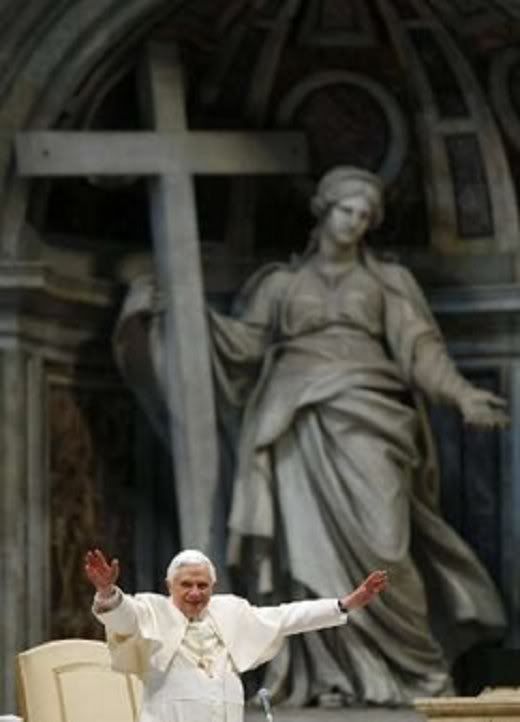
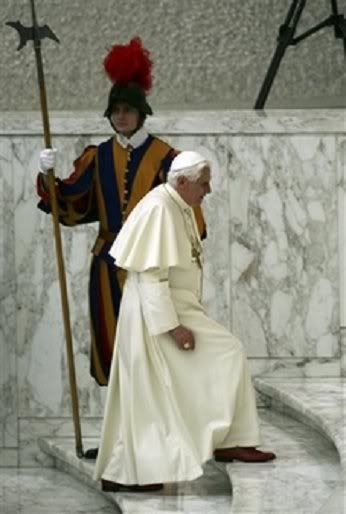 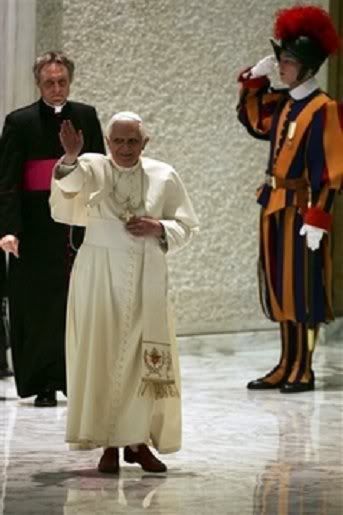
VATICAN CITY, Mar. 12 (Translated from AsiaNews) - In his catechesis at the General Auddience today, Pope Benedict XVI spoke about Boetius, a fifth-century Father of the Church who is "a symbol of all who, even today, suffer unjustly from ideological, political or religious persecution,"
Once again, the Pope had to address the faithful in two places - first inside St. Peter's Basilica for the overflow crowd, and later at the Aula Paolo XVI where he delivered his catechesis.
In his teaching cycle on the Fathers of the Church, he turned his attention to Boetius and Cassiodorus, two representatives in the High Middle Ages of "a time of encounter among cultures, just as we live in today, which marked the final phase of the Roman empire."
The Holy Father spoke about this encounter of cultures and the training of the younger generations - both themes dear to him - in his brief greetings to students in St. Peter's Basilica and in his catechesis for the day.
In this age of multi-culturalism and rapid changes, the Pope said that schools 'face remarkable challenges' and therefore should not be 'simply places for learning about ideas, but should offer students the possibility to receive valid messages of a cultural, social, ethical and religious character."
He also said teachers should realize that human beings hunger for knowledge, but that they act according to what they learn.
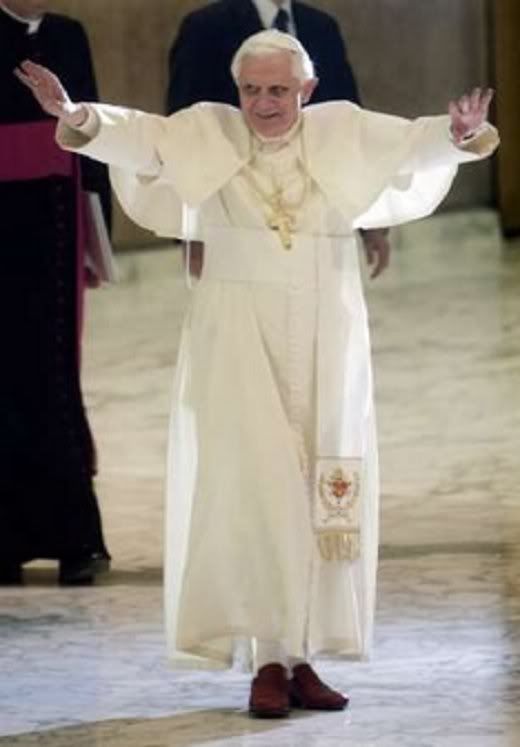
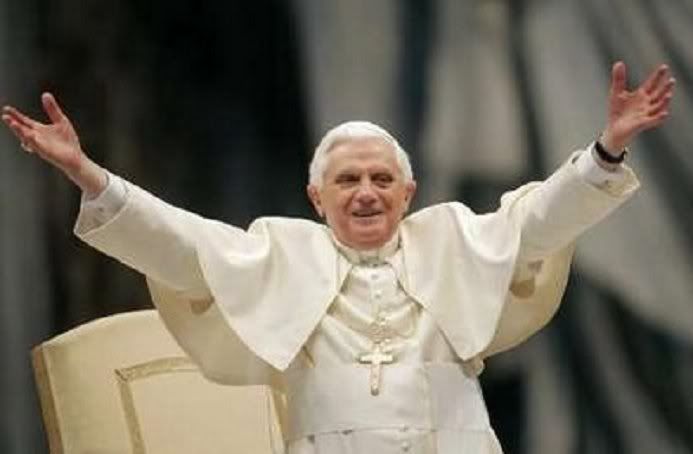
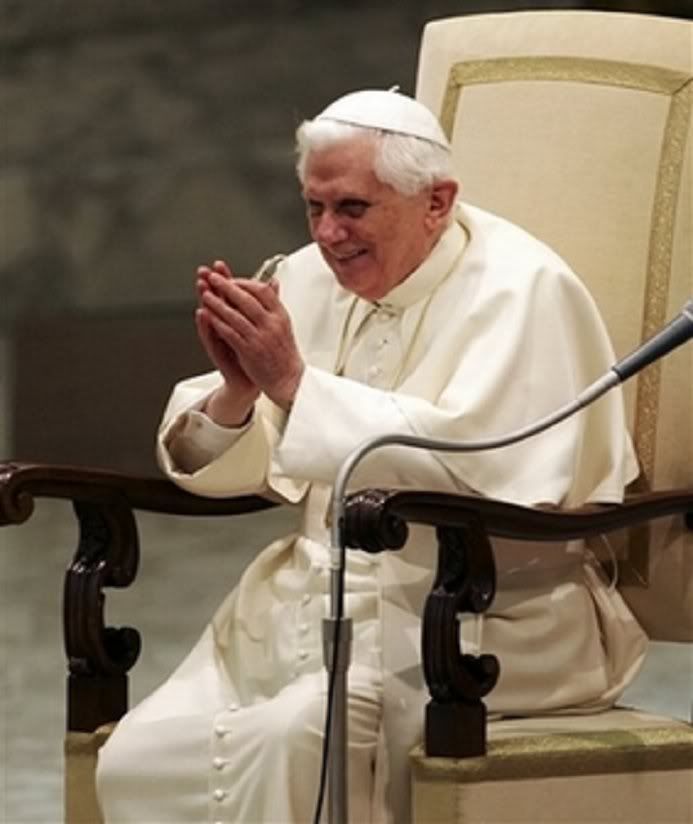
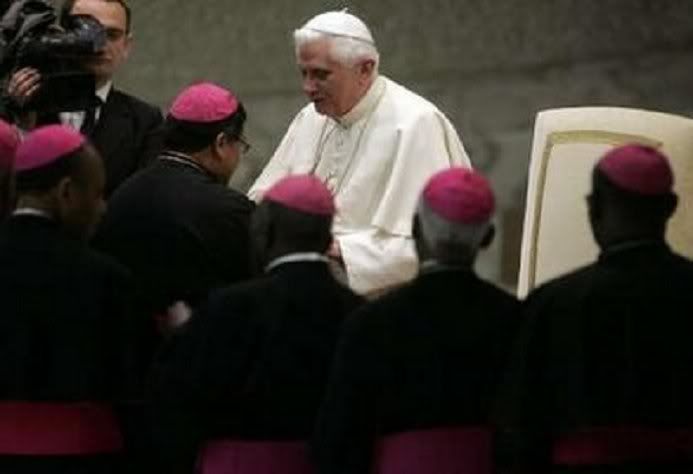 [Modificato da TERESA BENEDETTA 12/03/2008 16:36] |
 12/03/2008 14:51 12/03/2008 14:51 |
|
| | | OFFLINE | | Post: 468 | Registrato il: 25/05/2006
| Utente Senior | |
|
BENVENUTO IN LINGUA LATINO
there was a "new language" at today's GA - enchoy and listen please here:
de.youtube.com/watch?v=zLwIqswfaxw
******************************************************************************************************************
 
******************************************************************************************************************
|
 12/03/2008 21:50 12/03/2008 21:50 |
|
| | | OFFLINE | | Post: 12.341 | Registrato il: 28/08/2005
| Utente Gold | |
|
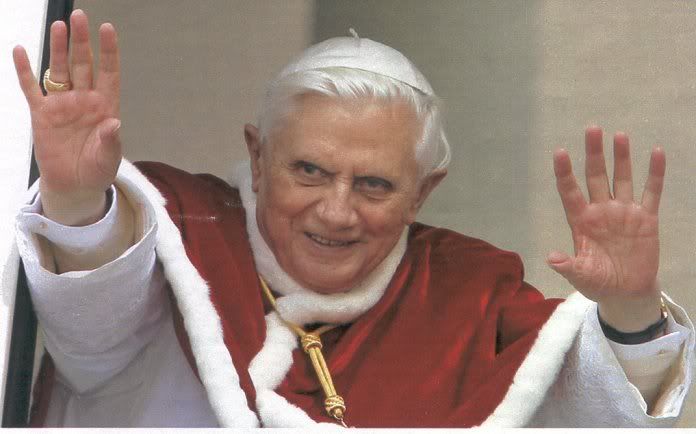 Benedict’s Imprint:
Benedict’s Imprint:
A Kinder, Gentler Catholicism
By Hugh McNichol
Pewsitter.com
March 12, 2008
Benedict XVI indeed is presenting a new methodology of Catholic evangelization and catechesis. The most succinct manner of classifying his new age of Catholic global teachings is this: He is moving towards a kinder, gentler Church for the new millennium.
That does not imply there will be a dramatic shift from the authoritarian paradigm that is the foundation for moral and ethical teachings from the Bishop of Rome. However, Benedict’s didactic applications are based upon a deeper development and faith in the human person’s most intimate relationship with God, each other and institutional religion.
It seems the Holy Father is calling the entire Catholic world to a new realization and expectation of the drastic implications offers by Jesus in His command, “Love one another.”
So far, the Benedictine hermeneutics have been keenly oriented towards reconciliation between the East and West, both in ideology and political convictions. There is a new spirit of Catholic and Orthodox ecumenism, a restored sense of the acutely painful division between Christian denominations and a fresh optimism of positive understandings with our Islamic counterparts.
As mentioned in previous columns, it certainly appears that Benedict XVI is initiating a new age of Boneventurian mysticism.
Most significantly, the Benedictine platform of pastoral theology includes an intensely deep awareness of the need and desire all faiths should have towards restored unity in faith, politics and activities on a global scale.
The activities of the Holy See over the past few months have clearly been directed towards the spirit of international harmony. Benedict’s visit to the United Nations in April will most likely bring about a message of international cooperation and service on the part of the Church. Such an affirmation of a global Church involvement and continuity to the unification message is a hallmark of this pontificate.
Consistently, Benedict’s pastoral theology concentrates on the qualitative deepening of the Church’s sacred mysteries through human healing and relationships. This message is nothing new for the Catholic Church; however, the implementation of Benedict’s vision for the Church hinges on this critical and important message.
Benedict’s demeanor is promoting introspective understanding of the Church’s role in our global society, and offers the Church as the healer of conflicts from ecological abuses to human rights violations and the entire spectrum of transgressions humanity has committed against God, against other men and against the planet.
The message is clear; the pursuit of religious belief in God is indeed a transcendent mystery that requires a local, national and global acceptance of our common humanity and universal dependence on God’s providence for all peoples.
Benedict’s pastoral messages and indeed his pastoral journeys signify very clearly that the Church offers the mystery of salvation to the entire world. In the past, that message was conveyed in a manner that was less than unifying.
But the Benedictine Church is growing as a kinder, gentler Church reaching out with paternal reconciliation and love to a fractured group of global believers.
|
 12/03/2008 23:01 12/03/2008 23:01 |
|
| | | OFFLINE | | Post: 12.342 | Registrato il: 28/08/2005
| Utente Gold | |
|
  The Pope's social encyclical
The Pope's social encyclical
'CARITAS IN VERITATE' -
(CHARITY IN TRUTH)
ROMA, Mar. 12 (Translated from ANSA) - Pope Benedict XVI's third encylical dedicated to social issues will be entitled CARITAS IN VERITATE (Charity in truth).
Vaitcan sources also said the expected date of release is May 1, Feast of St. Joseph, Patron of Laborers. [A Panorama article a few weeks ago had speculated that this would be the rlease date.]
However, there may be a delay if the official translation into Chinese is not finalized by then. It will be the first time that an encyclical will be issued in Chinese at the time of first publication.
It may also be published in Arabic from the start. [Before this, encyclicals have been issued initially in the seven official languages of the Vatican - Latin, Italian, French, English, German, Spanish, Portuguese.]
The new encyclical is said to be divided into four parts. The first part will cite two previous 'social encyclicas' - Paul VI's Populorum progressio (1967), and John Paul II's Sollicitufo rei socialis(1987).
Benedict is expecetd to spell out the vision of the Church today with respect to the social changes that have taken place since Papa Montini's encyclical 40 years ago - particularly, the process of globalization and the need for a humanism that reconciles social and economic development with the respect due to every human being and with a just relationship among the various social levels to attenuate the excessive disparity between rich and poor.
Poverty, peace, international cooperation, disarmament, energy sources, the environment, the digital gap, micro-credit: these are the other issues to be tackled by the Pope.
The publication of a third encyclical not too long after Benedict's second encyclical demonstrates how strongly the Pope feels about social issues and the specific concerns of the Church itself.
In fact, John Paul II had been planning to come out with another social encyclical, which was also discussed during the meetings of the College of Cardinals during the period of the Sede Vacante {after the death of John Paul II but before the Conclave).
Yesterday, most of the news agencies reported on statements made about the encyclical by Cardinal Bertone in the interview he gave at the end of his Armenia-Azerbaijan trip. Here is how CNS's John Thavis reported it:
VATICAN CITY, Mar. 11(CNS) -- Pope Benedict XVI is still working on his social encyclical, but it probably will not be ready before summer, a top Vatican official said.
"The Pope is reflecting and revising, and therefore we cannot predict. But I presume it will not be published before the summer vacation period," Cardinal Tarcisio Bertone, the Vatican secretary of state, said March 9.
Vatican sources said the Pope began work on the encyclical last year and that it would treat topics related to Catholic social teaching. His first two encyclicals examined the virtues of love and hope.
Cardinal Bertone, who spoke with the Italian news agency ANSA while visiting Azerbaijan, said the Pope was preparing his new text carefully.
"It needs to be written well. The Pope is making his reflections and annotations and is checking things rigorously," he said.
"I'm not saying the Pope is a true perfectionist, but in a certain sense he is," the cardinal said.
Cardinal Bertone said the encyclical would have to be translated into various languages before it would be released. He said he hoped that, with this encyclical, a Chinese translation would be published immediately with the other main languages.
[Modificato da TERESA BENEDETTA 13/03/2008 12:48] |
 13/03/2008 12:14 13/03/2008 12:14 |
|
| | | OFFLINE | | Post: 12.351 | Registrato il: 28/08/2005
| Utente Gold | |
|
  CALENDAR OF UPCOMING LITURGICAL CELEBRATIONS
CALENDAR OF UPCOMING LITURGICAL CELEBRATIONS
TO BE PRESIDED BY HIS HOLINESS BENEDICT XVI
March 13, Thursday
17:30 St. Peter's Basilica
Celebration of the Sacrament of Penance
with the youth of the Diocese of Rome
March 16, Palm Sunday
and Passion of the Lord
XXIII World Youth Day on the theme:
'You will receive power when the Holy Spirit comes upon you' (Acts 1,8)
09:30 Saint Peter's Square
- Blessing of the Palms, Procession
- HOLY MASS OF THE PASSION OF OUR LORD
The Holy Father will bless the palms and olive branches,
and celebrate the Mass of the Passion after the procession.
HOLY WEEK
March 20, MAUNDY THURSDAY
- HOLY MASS OF THE CHRISM
09:30 St. Peter's Basilica
- HOLY MASS OF THE LORD'S SUPPER
Cappella Papale
17:30 Basilica of St. John Lateran
The Holy Father will preside at a concelebrated Mass with the cardinals, bishops and priests (diocesan and religious)
present in Rome, as a sign of the close communion between the Pastor of the Universal Church and his brothers
in the priestly ministry. Then, he will wash the feet of 12 priests.
During the rite, the faithful will be asked to offer alms for the orphanage 'La edad de oro' (Golden age) in Havana, Cuba.
The collection will be given to the Holy Father at the Mass Offering.
At the end of the rites, the Blessed Sacrament will be translated to the Chapel of Adoration.
March 21, GOOD FRIDAY
- CELEBRATION OF THE PASSION OF THE LORD
Cappella Papale
17:00 St. Peter's Basilica
The Holy Father will preside at the Liturgy of the Word, the Adoration of the Cross and Communion.
- VIA CRUCIS
21:15 Colosseum
The Holy Father will preside at the Way of the Cross, at the end of which he will address the faithful
and impart the Apostolic Blessing.
March 22-23 EASTER SUNDAY
- EASTER VIGIL
Cappella Papale
21:00 St. Peter's Basilica
Basilica Vaticana: ore 21
The Holy Father will bless the new fire in the atrium of the Basilica.
After the processional entry with the Paschal Candle to the singing of the Exsultet, he will preside
at the Liturgy of the Word, the Baptismal Liturgy and the Eucharistic Liturgy, concelebrated
with the Cardinals.
- EASTER MASS
10:30 St. Peter's Square
The Holy Father will celebrate the Mass.
- 'URBI ET ORBI' BLESSING
12:00 Central Loggia, St. Peter's Basilica
[Modificato da TERESA BENEDETTA 13/03/2008 12:16] |
 13/03/2008 12:37 13/03/2008 12:37 |
|
| | | OFFLINE | | Post: 12.352 | Registrato il: 28/08/2005
| Utente Gold | |
|
  ABOUT TODAY'S
ABOUT TODAY'S
PENITENTIAL LITURGY
Translated from the
Italian service of

Benedict XVI presides today at a penitential liturgy for the youth of the Diocese of Rome at St. Peter's Basilica.
At the Angelus last Sunday, the Pope invited the young people to participate "in this appointment with the Mercy of God", calling it "a high point in the preparation for World Youth Day " whch will be celebrated ont he diocesan level on Palm Sunday, and which will culminate in the July international WYD in Sydney.
At the end of today's liturgy, a group of youth representatives will carry the Holy Year Cross in procession from St. Peter's Basilica to the nearby San Lorenzo International Youth Center, its permanent home.
At 8 p.m., the president of the Pontifical Council for the Laity, Cardinal Stanislaw Rylko, will celebrate Mass for the young people. This will be followed by a prayer vigil before the Blessed Sacrament, to last till midnight.
   The Pope heard some confessions last year during the first Penitential Liturgy.
The Pope heard some confessions last year during the first Penitential Liturgy.
[Pope Benedict initiated the Penitential Liturgy last year, in place of the usual youth assembly with musical numbers that used to mark the Thursday preceding the diocesan World Youth Day celebration on Palm Sunday. The main liturgy is followed by confessions heard at St. Peter's Basilica. Last year, more than 200 priests were available to hear confessions, and some 20,000 young people attended.]
Giovanni Peduto interviewed Mons. Lorenzo Leuzzi, director of the university pastoral ministry for the Diocese of Rome.
MONS. LEUZZI: The meeting this afternoon with Benedict XVI represents the culmination of the diocesan preparation for the 23rd World Youth Day. The entire course of the catechetical year for and with the young people of rRome has been centered on rediscovering the Sacrament of Confirmation, according to the recommendation of the Holy Father in his Message for the XXIII World Youth Day.
It is an important occasion because, in celebrating the Sacrament of Penance today, the youth and the Christian community will rediscover the new life made possible with the gift of the Holy Spirit that comes to every believer at Baptism.
I would say that in celebrating the mercy of God, we understand how Christian life is truly a gift that is entrusted to the responsibility of each of us.
And the youth are rediscovering the sacrament of Reconciliation?
Yes, this sacrament is important in the formative course, because it is an occasion for the young person to have greater awareness of his Christian identity, and the need for an ever more intimate relationship with the Lord, which reaches its peak in the sacrament of Eucharist.
How can young people become more conscientious about practising the sacrament of Reconciliation?
Many young people experience around them so much meanness and violence, but above all, so many difficulties in making a fresh start. I think that the lack of trust and hope in many of today's youth comes from this difficulty of understanding how and where to start anew.
I think the sacrament of Reconciliation is the great solution and occasion in which the young person can experience that only God can put life in motion again.
The theme chosen by the Holy Father for World Youth Day this year is "You will receive power when the Holy Spirit comes upon you" - which is also the guideline for all the preparations at the diocesan level leading to the international encounter in Sydney. What is meant when we say 'to experience the Holy Spirit'?
It means being aware that one has been baptized, that Christian life is sustained by the presence of the Spirit, which allows the believer to live his own life experience in a creative, new and always original way.
With Benedict XVI, the young people are helped to rediscover that Christian life is not a purely formal adherence to an idea or a moral plan, but is truly an experience of God who accompanies, with the gifts of the Spirit, our concrete and existential life.
We are approaching the third anniversary of Benedict XVI's Pontificate. What rapport has been established between the youth and the Pope?
It is a relationship that has been growing daily, not only for the affection and sentiment that characterizes young people, but above all, in their awareness that the Magisterium of Benedict XVI opens up new horizons to experience the faith concretely in their daily life.
In this sense, I believe that in Rome, the young people have been increasingly taking every opportunity to be with the Pope because he stimulates them to question, to think and to reflect so that they may be more effective witnesses to Christ in the various environments where they find themselves.
What do you think are the Pope's messages which have most impressed the youth?
Above all, simplicity. That the Gospel is a simple proposition while it is very profound. That the Gospel always needs to be thought over - and I think this is very important for youth because they themselves are in a state of continuous growth.
I think Benedict XVI is able to make them aware that youth, the experience of being young, means to live a Gospel that is continually rethought and rediscovered, which satisfies young people's desire to find something new all the time.
====================================================================
Here's a related story:
The Pope is not looking
just to 'party' with young people:
He is promoting a deeper
celebration of meeting Christ
By María de la Torre
ROME, MARCH 12, 2008 (Zenit.org).- As young people worldwide prepare for the upcoming diocesan and international World Youth Days, Benedict XVI is sending out the message that he's looking for more than just a party.
Monsignor Mauro Parmeggiani, Rome’s diocesan director for youth ministry, explained to ZENIT that the Pope wants to transform the traditional meeting with the youth, “which was a sort of party, into a real celebration, not only an external celebration."
The monsignor said the reason to celebrate at a youth day is in reality "an interior one, that of the meeting of man with God, with God’s mercy in his heart; from there Christian joy is born.”
In this context the Holy Father is hosting on Thursday a penitential liturgy in St. Peter's Basilica in preparation for Palm Sunday, which is the day the dioceses of the world celebrate World Youth Day. More than 20,000 young people have signed up for the event, which is also a lead-up to the international World Youth Day, to be held July 15-20 in Sydney, Australia.
With this liturgy, Monsignor Parmeggiani explained, the Pope has one objective: “To meet God who loves. The more the sense of God grows, the more the sense of my smallness before God grows, of my impotence before God, of my sin. From this the plea arises: ‘Have mercy on me, Lord, have mercy on me because I am a sinner.’”
The priest who works with Roman youth said young people’s attitudes toward confession, “despite what one might think, is positive.”
Confession, he clarified, “is a sacrament where you are confronted with the truth about yourself and your sins, your human misery, with God’s mercy. It is the sacrament that best responds to the need of man today, who has need of mercy, love and to place themselves face to face with God’s justice.”
“We must face life’s many aspects, and life after death,” said the prelate. “It is no wonder that the Pope in ‘Spe Salvi’ speaks of the last things -- death, judgment, heaven and hell -- as something to rediscover.”
The difficulty people have, both young and old, with going to confession, according to Monsignor Parmeggiani, “stems from the loss of the sense of sin, the loss of the sense of God.”
And the problem people have with confessing to a priest, he said, is a false one: “In a world where we are all ready to tell everything about ourselves anywhere -- on the radio, on the Internet, in blogs, forums, in text messages -- with all of these ways of communicating, where people communicate very intimate and personal things, I believe we shouldn’t be ashamed to open our hearts to God’s minister, who in that moment represents Christ, Christ who listens to me, Christ who encourages me, Christ who tells me, ‘Rise and walk.’”
The monsignor said another difficulty stems from the lack of firmness in one’s resolutions, which can lead on to say, “It's useless for me to go back to confession.”
“No one is perfectly consistent," he said. "We must continue to have faith, to let ourselves be guided by Christ, and not give up because we make one mistake.
"We must not give up and think that we cannot be free from this error.”
[Modificato da TERESA BENEDETTA 14/03/2008 14:43] |
 13/03/2008 12:44 13/03/2008 12:44 |
|
| | | OFFLINE | | Post: 12.353 | Registrato il: 28/08/2005
| Utente Gold | |
|
  POPE BENEDICT MOURNS
POPE BENEDICT MOURNS
THE DEATH OF MONS. RAHHO
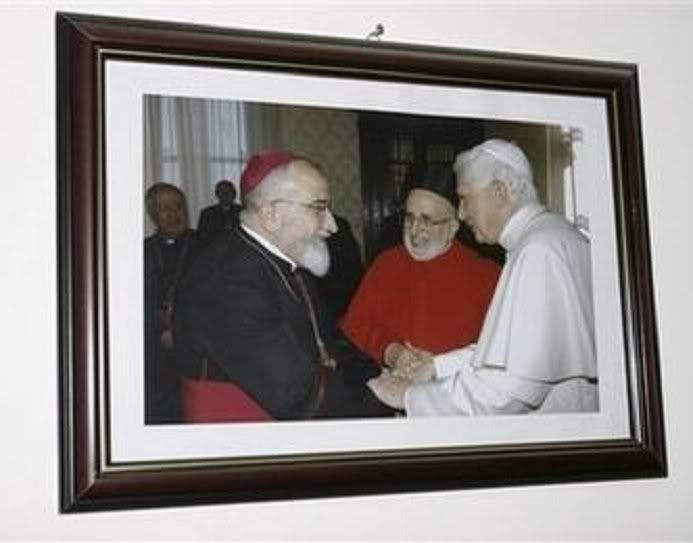 Mons. Rahho with the Pope and Cardinal Delly at the consistory last November.
Mons. Rahho with the Pope and Cardinal Delly at the consistory last November.
The Vatican has released the telegram of condolence sent by the Holy Father to Cardinal Emmanuel II Delly, Patriach of babylon of the Chaldeans, on the death of the Archbishop of Mosul. Here is a translation of the Italian text:
TO HIS BEATITUDE
THE MOST EMINENT CARDINAL
EMMANUEL III DELLY
PATRIARCH OF BABYLON OF THE CHALDEANS
INFORMED OF THE TRAGIC DEATH OF MONSIGNOR PAULOS FARAJ RAHHO, ARCHBISHOP OF MOSUL OF THE CHALDEANS FOLLOWING HIS ABDUCTION ON FEBRUARY 29, I WISH TO CONVEY TO YOU, TO THE CHALDEAN CHURCH, AND TO THE ENTIRE CHRISTIAN COMMUNITY, MY PARTICULAR CLOSENESS, REAFFIRMING THE MOST DECISIVE DEPLORATION OF AN ACT OF INHUMAN VIOLENCE WHICH OFFENDS THE DIGNITY OF THE HUMAN BEING AND SERIOUSLY HARMS THE CAUSE OF FRATERNAL COEXISTENCE AMONG THE BELOVED PEOPLE OF IRAQ.
WHILE I ASSURE MY FERVENT PRAYERS OF INTERCESSION FOR THE ZEALOUS PASTOR WHO WAS KIDNAPPED SOON AFTER HE HAD LED THE WAY OF THE CROSS, I INVOKE THE LORD'S MERCY THAT THIS TRAGIC EVENT MAY HELP TO BUILD, FOR THE TORMENTED PEOPLE OF IRAQ, A FUTURE OF PEACE.
WITH THESE SENTIMENTS, I IMPART ON YOU, VENERATED BROTHER, YOUR PRIESTS, CONSECRATED PERSONS AND ALL THE FAITHFUL, THE COMFORT OF AN APOSTOLIC BLESSING.
BENEDICTUS PP. XVI
Earlier, Vatican news director Fr. Federico Lombardi had relased this statement, translated here:
The news of the death of Bishop Rahho, who had been abducted two weeks ago, has deeply affected and saddened the Holy Fahter, who was immediately informed.
Everyone had continued to hope and pray for his liberation, as the Pope had called for several times in public appeals.
Unfortunately, the most absurd and unjustified violence continues to afflict the Iraqi people, and the small Christian community, in particular, to which the Pope and all of us are particularly close in prayer and solidarity in this time of great sorrow.
It is hoped that this tragic event urges yet again and more forcefully the commitment of everyone, and in particular, of the international community, for the pacification of a country that is suffering so much.
The news agency SIR of the Italian bishops conference announced the news in Rome first:
"Monsignor Rahho is dead. We found him dead in the outskirsts of Mosul. His abductors had buried him," the auxiliarybishop of Baghdad, Mons. Shlemon Warduni, announced through SIR.
Chaldean bishop Paul Faraj Rahho, 63, had been kidnapped last February 29 after he left a Church in Mosul where he had just led ithe Way of the Cross. His driver adn two bodyguards with him were shot to death by the abductors during the kidnapping.
"In the last few hours, we had been informed by the kidnappers that the bishop was very ill, then they called us to say he had died . In a succeeding telephone call, they told us where they had buried him. Some of our young parishioners followed the instructions given, where they dug out the grave and recovered the body. We do not know yet whether he died because of his precarious ehalth or whether he was killed."
The kidnappers' ransom demand in previous days had raised hopes that the bishop would be released.
Pope Benedict had appealed publicly three times for his quick and safe release.
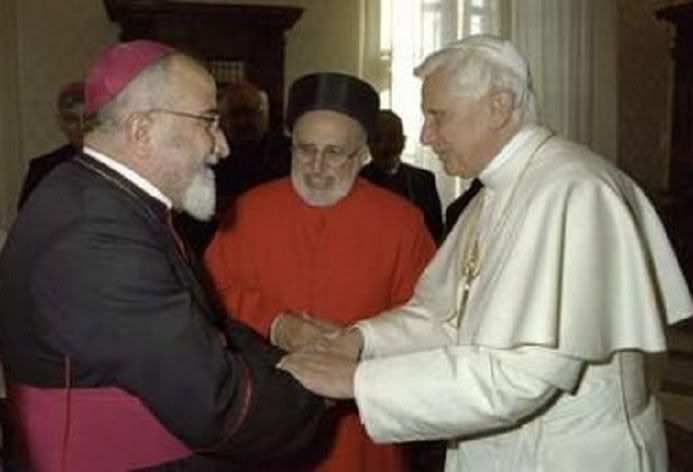 AsiaNews reported it independenttly from Mosul:
AsiaNews reported it independenttly from Mosul:
MOSUL, Marc. 13 (AsiaNews) - The Chaldean archbishop of Mosul is dead. Archbishop Faraj Rahho was kidnapped last February 29 after the Stations of the Cross.
His kidnappers informed mediators of his death and told them where they could recover the body of the 67-year-old prelate.
"It is a heavy Cross for our Church, ahead of Easter", Rabban al Qas, bishop of Arbil, tells AsiaNews in response to the news.
The rest of the item is translated from the AsiaNwes Italian service:
Prelates of the Chaldean Church are bringing the body to the hospital in Mosul to ascertain the cause of death.
The funeral could be held as early as tomorrow in the nearby town of Karamles.
At the time he was kidnapped, Mons. Rahhho was already quite ill. A few years ago, he suffered a heart infarct, after which he had to take daily medication.
The difficult negotiations attempted in the past 14 days had raised great concern because of the total absence of direct contact with the hostage.
Among the conditions imposed by the adbudctors, sources told AsiaNwes, in addition to a ransom of millions of dollars was to provide arms and to liberate Arab prisoners from Kurdish prisons.
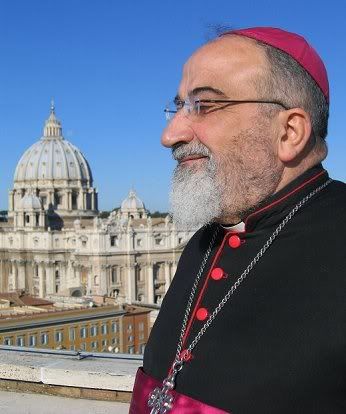 Here are the English reports so far, all apparently based on the SIR report:
The archbishop of Mosul is dead
Here are the English reports so far, all apparently based on the SIR report:
The archbishop of Mosul is dead
BAGHDAD, Iraq, Mar. 13 (CNN) -- A Christian archbishop kidnapped in northern Iraq last month has been found dead, according to a Nineveh province deputy governor in the town of Mosul.
Chaldean Catholic Archbishop Paul Faraj Rahho was found Thursday near Mosul, where he and three companions were ambushed by gunmen on February 29.
The others were killed, and Iraqi Prime Minister Nuri al-Maliki had ordered security services to make it a priority to find and free the archbishop.
The kidnapping was condemned across the world, and came from the Vatican, Jordan's Prince Hassan, and the United Nations. It came during a push by Iraqi and U.S. troops against al Qaeda in Iraq insurgents in Mosul.
Christians are a tiny fraction of Iraq's population, but insurgents have targeted their religious sites and leaders in recent years.
Kidnapped Chaldean archbishop
found dead
ROME, Mar. 13 (AFP) - A Chaldean Catholic archbishop kidnapped last month in northern Iraq was found dead on Thursday, the information service of the Italian Catholic Church said Thursday.
The body of Paulos Faraj Rahho, the archbishop of Mosul who was kidnapped on February 29, was found near the northern city, the Church said, quoting the auxiliary archbishop of Baghdad, Shlemon Warduni.
It was unclear if he died of natural causes or was killed.
The kidnappers had telephoned to inform the Baghdad prelate that Rahho, who was in poor health, had died and that they had buried him, the Church's news agency SIR reported.
"The kidnappers had told us already yesterday (Wednesday) that Monsignor Rahho was very ill, and yesterday afternoon they told us that he died. This morning, they telephoned us to say they had buried him," Warduni said, adding that the kidnappers indicated the location of the body.
"We still don't know whether he died from his poor health or was killed," Warduni said. "The kidnappers only told us that he was dead."
Rahho was kidnapped in Mosul after a deadly shootout in which three of his companions were killed.
Pope Benedict XVI reacted with "deep sadness" to the news of Rahho's death, a Vatican spokesman said.
"The most absurd and unjustified violence continues to afflict the Iraqi people and in particular the small Christian community whom the pope ... holds in his prayers ... in this time of deep sadness," Father Federico Lombardi said.
"This tragic event underscored once more and with more urgency the duty of all, and in particular of the international community, to bring peace to a country that has been so tormented," Lombardi said.
Iraqi forces in Mosul had fanned out to search for Rahho, who was the latest in a long line of Chaldean clerics to be abducted in Iraq since the US-led invasion in March 2003.
Two priests were kidnapped in the city in October, and last June a priest and three deacons were attacked in front of their church.
Iraq's Christians, with the Chaldean sect by far the largest community, were said to number as many as 800,000 before the 2003 invasion.
Associated with the "Crusader" invaders and regarded as well-off, they are now victims of sectarian cleansing, killings and kidnappings at the hands of both Sunni and Shiite Islamists, as well as criminal gangs.
Bishop kidnapped in Iraq is dead
ROME, Mar. 13 (AP) - A Chaldean Catholic archbishop kidnapped in Iraq last month has been found dead, the news agency of Italian bishops' conference reported on Thursday.
The SIR news agency says Archbishop Paulos Faraj Rahho was found dead near the Iraqi city of Mosul, where he had been abducted.
"Monsignor Rahho is dead. We have found him lifeless near Mosul," the agency quoted the auxiliary bishop of Baghdad, Monsignor Shlemon Warduni, as saying. "The kidnappers had buried him."
Rahho was kidnapped on Feb. 29 soon after he left Mass in Mosul. Three people who had been with him were killed by the kidnappers. Pope Benedict XVI immediately called for his release and said the abduction was an "abominable" act.
The Chaldean church is an Eastern-rite denomination that recognizes the authority of the Pope.
====================================================================
THE POPE MOURNS
THE DEATH OF EDOARDO LUCIANI, 91
Earlier today, the Vatican had released the text of a telegram of condolence sent by the Holy Father yesterday to the Bishop of Belluno-Feltre. Here is a translation:
MOST REVEREND MONS. GIUSEPPE ANDRICH
BISHOP OF BELLUNO-FELTRE
HAVING LEARNED OF THE SAD NEWS OF THE DEATH OF THE COMMENDATORE EDOARDO LUCIANI, BROTHER OF THE LAMENTED SERVANT OF GOD JOHN PAUL I, AND REMEMBERING OUR LAST MEETING IN LORENZAGO DI CADORE, I WISH TO MANIFEST MY SINCERE PARTICIPATION IN THE SORROW OF HIS FAMILY AND THE COMMUNITY OF BELLUNO.
REMEMBERING HIS EXCEPTIONAL HUMAN AND CHRISTIAN VIRTUES, PARTICULARLY HIS EXEMPLARY DEDICATION TO HIS FAMILY, HIS GENEROUS SERVICE TO THE CHURCH AND HIS INTENSE CIVIC COMMITMENT, I OFFER FERVENT PRAYERS THAT THE DECEASED MAY SHARE WITH THE RESURRECTED LORD, ALONGSIDE HIS BELOVED SPOUSE AND HIS BROTHER PONTIFF, JOY AND PEACE WITHOUT END.
WHILE I ENTRUST TO THE MATERNAL PROTECTION OF THE BLESSED VIRGIN ALL HIS CHILDREN AND EVERYONE WHO MOURNS THE DEATH OF THIS ILLUSTRIOUS MAN, I IMPART FROM THE HEART THE COMFORT OF AN APOSTOLIC BLESSING, EXTENDING IT AS WELL TO ALL WHO WILL BE PRESENT AT THE FUNERAL SERVICES.
BENEDICTUS PP XVI
News of Mr. Luziani's death was posted in NOTABLES on 3/11/08.
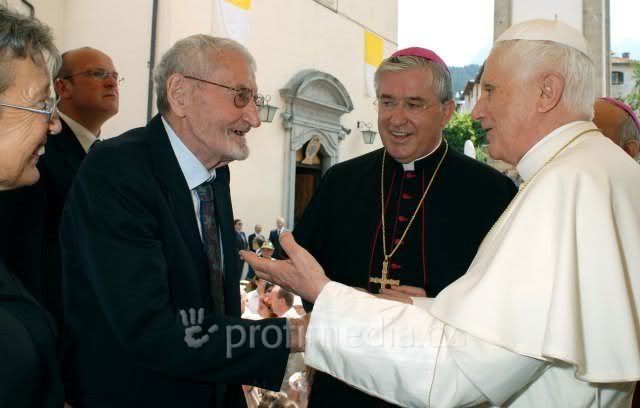 At Lorenzago last July, Edoardo Luciani came specially to greet the Pope, accompanied by his daughter Pia.
At Lorenzago last July, Edoardo Luciani came specially to greet the Pope, accompanied by his daughter Pia.
With the Pope is Mons. Andrich.
[Modificato da TERESA BENEDETTA 13/03/2008 21:51] |
 13/03/2008 22:55 13/03/2008 22:55 |
|
| | | OFFLINE | | Post: 12.354 | Registrato il: 28/08/2005
| Utente Gold | |
|
BENEDICT THE CONFESSOR
At the Penitential Liturgy this afternoon (3/13) for the youth of the Diocese of Rome, the Holy Father stepped out of his ceremonial robes after the liturgy to hear the confessions of a few selected youths.



 The Pope to the youth of Rome:
The Pope to the youth of Rome:
'Beware not to sell your soul -
success often masks an empty life'
By Gianluca Barile
Translated from PETRUS
VATICAN CITY - "The facade of success often hides an empty existence," Benedict XVI reminded the youth of Rome at a penitential assembly at St. Peter's Basilica Thursday evening in preparation for the diocesan celebration of World Youth Day next Sunday, Palm Sunday.
Speaking on the theme for WYD 2008, 'You will receive power when the Holy Spirit comes upon you', the Pope recalled a film called Metempsicosi[metempsychosis, a Greek term for reincarnation] to explain 'the action of the Holy Spirit on the soul'.
"The film," he said, "tells the story of two poor devils who, because of their goodness, could not get anywhere in life. One day, it occured to one of them that, not having anything else, he could sell his soul. He put it into a box and it went cheaply. But from that moment on, to his great surprise, everything changed in his life: he began a rapid ascent, became increasingly rich, obtained great honors, and by the time he died, was very well-endowed with money and goods."
But "from the moment that he gave up his soul, he lost his humanity, he acted without scruples, bent only on profit and success," the Pope said. "Other men no longer counted for him, becuase he himself no longer had a soul. Although it seemed like he had lost nothing, he did not have a soul, and when there is no soul, then one has nothing. "
Obviously, said the Pope, the human being cannot literally throw out his soul, because it is the soul that makes him a person, even though he remains a human being. However, "he has the frightening possibility to become 'dishuman', a person selling and losing his humanity. The distance between the human person and the dishuman is immense, even though we annot demonstrate it."
The Pope pointed out that "even the Holy Sppirit cannot be proven to the external eye: he penetrates a person or not, though this cannot be seen or demonstrated: but when he does, it changes and renews the entire prospect of human existence."
"The Holy Spirit does not change the exterior situations of life - rather interior. Even this evening, the Spirit will descend on our hearts, to forgive sins and renew us interiorly, re-investing us with the strength which make sus, like the Apostles, audacious in announcing Christ who died and was resurrected.
"Remember always that you are a temple of the Spirit: allow him to dwell in you and obey his bidding docilely, to bring your contribution to the edification of the Church and discern the vocation to which the Lord calls you.
"Even today, the world needs priests, consecrated men and women, Christian spouses. To respond to a calling to any of these ways, be generous, be aided by reocourse to the scarmaent of confession and through the practice of spiritual direction in your journey as Christians. Seek in particular to open your heart sincerely to Christ to offer him your unconditional Yes.
"Dear young people, the city of Rome in in your hands. It is up to you to make her beautiful even spiritually through your testimony of lives lived in the grace of God and remote from sin, adhering to everything that the Holy Spirit calls you to be in the church and in the world.
"The Lord Jesus washes away our sins, heals us of our faults, adn strengthens us so we do not succumb to the battle against sin, and in testifying to his love."
The Pope recalled how John Paul II inaugurated, 25 years ago, the San Lorenzo International Youth Center next to the Vatican. He called it "a spiritual initiative which, along with many others in the Diocese of Rome, promotes a welcoming place for young people, where they can exchange experiences and testimonies to the faith, and above all, be together in prayer which makes us discover the love of God."
"As Pope John Paul II said," he concluded, "become yourselves redeemers of the youth of the world."
Following a tradition started by John Paul II, the Pope then went to a confessional to hear the confessions of some young people. He spent about 45 minutes in the confessional, hearing confession from three females and three males.
After a general confession, read by fourteen young people, confessors from the four papal basilicas as well as several other priests spread out through various parts of the Basilica to hear confessions.
Choirs sang psalms and there were readings from the Bible, from the Church Fathers and from the Magisterium.
After the rites at the Basilica, a group of young people carried the WYD Cross in procession to the San Lorenzo center, where the president of the Pontifical Council for the Laity, Cardinal Stanislaw Rylko, celebrated Mass, followed by a prayer vigil with adoration of the Blessed Sacrament.
L'Osservatore Romano released photos of the Pope entering the confessional,
and emerging from it afterwards.
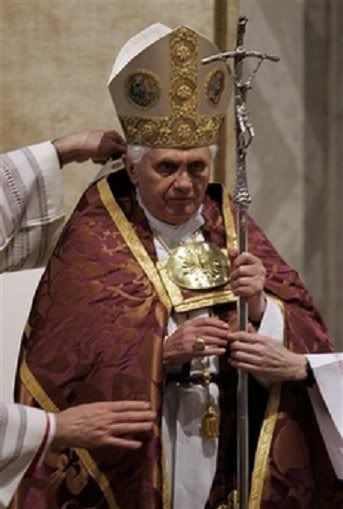 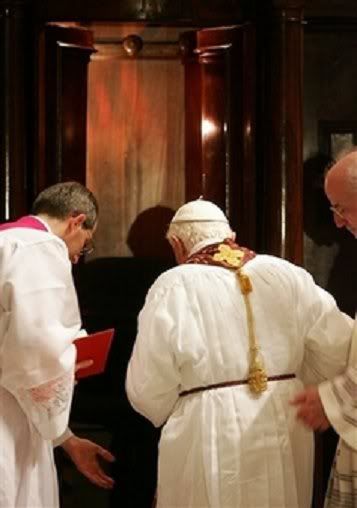
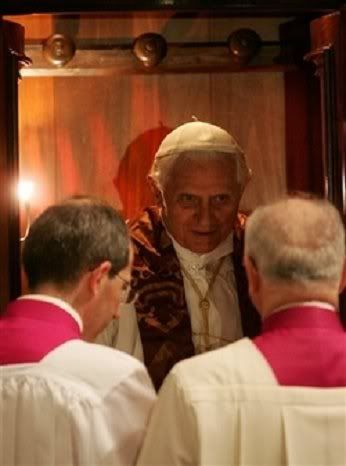 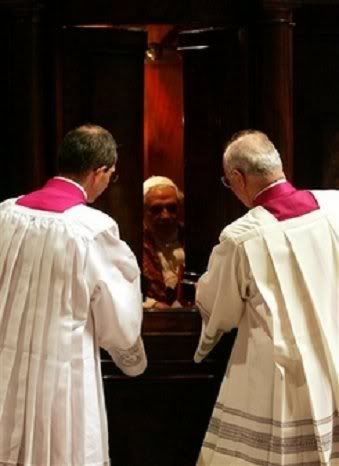
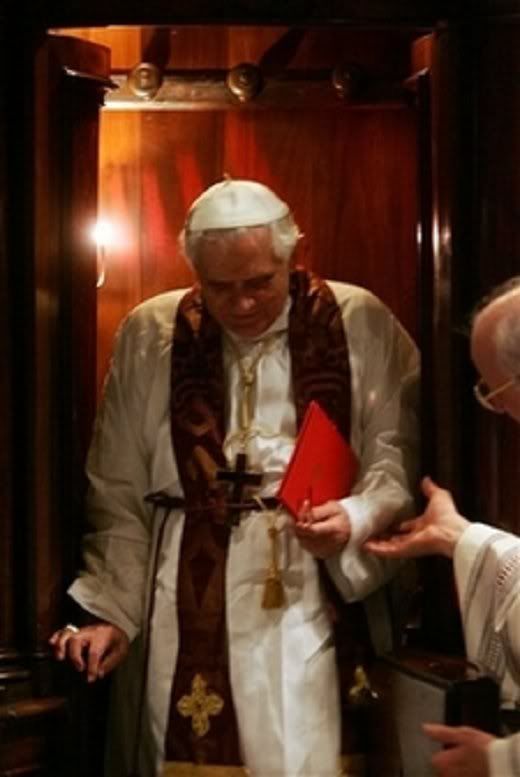
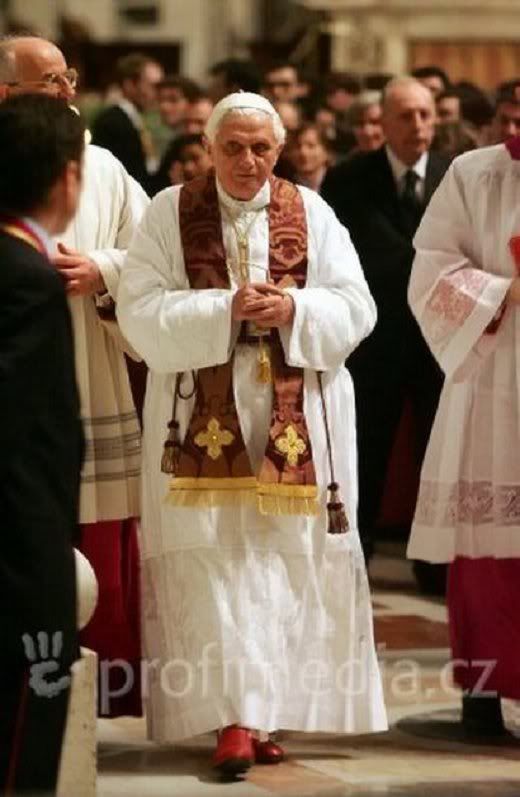 Pope hears confessions of the young:
Pope hears confessions of the young:
'You are temples of the Holy Spirit'
By Cindy Wooden
3/14/2008
VATICAN CITY , March 13(CNS) - By confessing our sins, we open our hearts to God and prepare to receive the gifts of the Holy Spirit, Pope Benedict XVI told thousands of young people from Rome before hearing individual confessions.
"Through the action of the Holy Spirit and the ministry of the church," the Pope said, the sacrament of reconciliation brings "pardon and peace."
Pope Benedict's penance service with the young people in St. Peter's Basilica March 13 was held in preparation for the Palm Sunday diocesan celebration of World Youth Day and looking ahead to the July 15-20 international celebration of World Youth Day in Sydney, Australia.
The World Youth Day 2008 theme is "You will receive power when the Holy Spirit has come upon you; and you will be my witnesses."
In his homily, the Pope said the Holy Spirit cannot be seen and the degree of the Spirit's presence in a person cannot be measured, but the Holy Spirit "changes and renews" one's whole life.
"This evening, the Holy Spirit will descend into our hearts to forgive our sins and renew us interiorly, giving us a strength that will make us, like the apostles, bold in proclaiming that Christ has died and is risen," he said.
Pope Benedict urged the young people, "Always remember that you are 'temples of the Holy Spirit.'"
"Let him live in you and docilely obey his indications in order to make your contribution to building up his church," the Pope said. He added that the young people can do this particularly by praying about whether God is calling them to the priesthood or religious life or to be Catholic spouses and parents.
After the homily, seven young people led their peers in an examination of conscience looking at ways they may have betrayed the gifts of the Holy Spirit: wisdom, understanding, counsel, fortitude, knowledge, piety and fear of the Lord.
Among other things, the young people asked themselves about ignoring the wise teachings of the church; being satisfied with the superficial; not bringing peace to their families, schools and workplaces; not accepting immigrants; not allowing themselves and their passions to be guided by the church; not being honest and faithful in relationships; not responding to God's love with concrete acts of charity; and "the impure use of our bodies."
After the examination of conscience, the Pope and 55 priests who hear confessions daily in the basilicas of Rome, moved into confessionals or to chairs set up against the walls to offer the sacrament to individual penitents.
The Pope, dressed in a simple white alb and purple stole, spent almost 45 minutes hearing confessions.
Cardinals and bishops joined priests to hear confessions all over the Basilica.
 
[Modificato da TERESA BENEDETTA 18/03/2008 03:40] |
 13/03/2008 23:19 13/03/2008 23:19 |
|
| | | OFFLINE | Post: 377 | Registrato il: 24/11/2005
| Utente Senior | |
|
I was wondering how they picked the young people who's confessions the Pope would hear! I assume they know that its Papa that will be hearing their confession some time in advance. Different stole & pectoral cross this year, I like it. By the way, a re-air of the Penance Service tonight at 10:30pm on EWTN.
|
 14/03/2008 13:24 14/03/2008 13:24 |
|
| | | OFFLINE | | Post: 12.358 | Registrato il: 28/08/2005
| Utente Gold | |
|
 
  Papal panel urges 'constructive dialogue'
Papal panel urges 'constructive dialogue'
between Vatican, China
VATICAN CITY, Mar. 13 (AFP) — A papal commission on Thursday reasserted the Vatican's wish for "constructive dialogue" with China following a three-day meeting this week, the Holy See said in a statement.
The commission, led by Vatican number two Tarcisio Bertone and including bishops from Taiwan, Macau and Hong Kong, followed up on a pastoral letter addressed by Pope Benedict XVI to Chinese Catholics in May 2007.
"In line with the indications expressed by the pope in his letter, the will for a respectful and constructive dialogue with the authorities was reiterated," the Vatican statement said.
"The participants exchanged information and experiences concerning the life and activity of the Church in China," it added.
The Pope's strongly worded letter to the eight to 12 million Chinese Catholics loyal to Rome, made public in June 2007, said the communist regime should respect their "authentic religious freedom" and warned that China's official church was "incompatible with Catholic doctrine."
The letter also expressed the hope for "a respectful and open dialogue" between the Vatican and Beijing.
China immediately rebuffed the appeal and urged the Vatican to refrain from creating new barriers to improved relations.
Beijing severed ties with the Vatican in 1951 in anger at the Holy See's diplomatic recognition of Taiwan, which Beijing views as a renegade province.
In 1957, the split became permanent when China set up the Patriotic Association to formally oversee the country's officially registered Catholics.
The Holy See said the commission, which met from Monday to Wednesday, discussed "certain important aspects regarding the Church's mission as 'instrument of salvation' for the Chinese people."
It cited "evangelisation in a world experiencing globalisation ... forgiveness and reconciliation within the Catholic community (and) the government of dioceses, which has great relevance for pastoral activity and for the formation of priests, seminarians, religious and lay faithful."
The participants met on Wednesday with Benedict, who encouraged them to continue working in support of China's Catholics, the Vatican said.
The size of the government-led Church in China is estimated at up to five million, while between eight and 12 million "underground" Chinese Catholics are estimated to pledge allegiance to the pope.
They worship in unofficial churches and complain of frequent harassment by police and government officials.
The Vatican says it will abandon ties with Taiwan in favour of Beijing if China guarantees religious freedom and allows the pope to name Chinese bishops.
Beijing has imposed two conditions on the restoration of ties -- the Vatican's recognition of the one-China policy that precludes independence for Taiwan and its acceptance that religious affairs are an internal Chinese matter.
Vatican wants dialogue with China
VATICAN CITY, Mar. 13 (AP) - The Vatican and its high-ranking clergy in China want to have a "respectful and constructive" dialogue with Beijing authorities over the role of the Catholic church there, the Vatican said Thursday.
The call came this week during a meeting of a special commission on China created by Pope Benedict XVI. Among the participants at the meeting was Hong Kong Cardinal Joseph Zen, an outspoken champion of religious freedom who at times has drawn the ire of Beijing authorities.
The Vatican said in a statement that participants focused on issues concerning the life of the Catholic Church in China. The pope, who has made improving relations with China a priority, is keen to restore diplomatic relations with Beijing.
Beijing broke ties with the Vatican in 1951 after the Communists took power in China.
Millions of Chinese belong to unofficial congregations that are loyal to the Pope and risk harassment.
The Pope sent a letter to Catholics in China last year, praising the underground church but also urging reconciliation with the official church.
"In line with the indications expressed by the Pope in his letter, the will for a respectful and constructive dialogue with the authorities was reiterated," during the meeting, the Vatican statement said.
Catholic clergy in China have at times been jailed and worship is allowed only in state-backed churches, which appoint their own bishops in defiance of the Vatican.
But last year, a cleric well-regarded by the Vatican was installed as bishop of Beijing by China's state-controlled Church, a move seen as easing tensions between the Chinese government and the Holy See, which insists that the Pope appoint bishops.
|
 14/03/2008 13:56 14/03/2008 13:56 |
|
| | | OFFLINE | | Post: 12.360 | Registrato il: 28/08/2005
| Utente Gold | |
|
    Catholic colleges expect Pope
Catholic colleges expect Pope
to deliver stern message
By Jacqueline L. Salmon and Michelle Boorstein
Washington Post
Friday, March 14, 2008
After years of Vatican frustration over what it views as the failure of many U.S. Catholic colleges to adhere to church teachings, school leaders are intently watching for a rebuke from Pope Benedict XVI during his Washington visit next month.
The Pope requested the meeting with more than 200 top Catholic school officials from across the country. The gathering will come amid debate over teachings and campus activities that bishops have slammed as violating Catholic doctrine: a rally by pro-abortion rights Democratic presidential candidate Hillary Rodham Clinton at St. Mary's University in San Antonio; a Georgetown University theologian's questioning whether Jesus offers the only road to salvation; and a performance of "The Vagina Monologues" at the University of Notre Dame.
This will be the first papal address in the United States on Catholic education in more than 20 years, and some Vatican watchers predict that it will be the most enduring part of Benedict's visit.
Before becoming Pope, Benedict was known as "the enforcer" of Church orthodoxy, and since taking office, he has said Catholic education must bow to Catholic "truth" and the "rule of life." Such comments have some educators keyed up.
"With people expecting his address on these issues, hopes and concerns are beginning to resurface," said Mathew Schmalz, a religious studies professor at the College of the Holy Cross in Worcester, Mass., who has researched and lectured about Catholic identity in higher education.
The Rev. Timothy Broglio, archbishop of the U.S. military services, who served in Rome for a dozen years, said Benedict's speech will be direct. "It'll be very clear and distinct ideas," Broglio said. ". . . There will be no mistaking what he wants to say."
A drumbeat for greater orthodoxy in Catholic colleges has been heard since 1990, when Pope John Paul II issued a call for Catholic colleges and universities to refocus on their religious identity.
Now educators are waiting to see how tough Benedict, a former theology professor in Germany, will be at the April 17 lecture at Catholic University and how his message will be interpreted and carried out by the bishops after he leaves.
Church officials won't give details about the content of the speech, but conservative Catholics are predicting -- and hoping for -- shock waves from Benedict, who before becoming Pope was associated with public reprimands of Catholic theologians and blocked appointments of university faculty members he thought were too liberal.
"This is something that's been simmering for so long that it's reached a boiling point," said Patrick Reilly, president of the Cardinal Newman Society, which works to promote orthodoxy in Catholic higher education.
In its recommendations to students, the society says only 20 of the 235 U.S. Catholic colleges and universities are sufficiently orthodox. Reilly said a number of bishops and Vatican officials say privately that the speech will "raise a lot of eyebrows."
As Pope, Benedict has not been as explicit about the limits of academic freedom as some had expected him to be, and some educators predicted that the talk next month will have a pastoral tone. However, they said, it will make clear that the Pope thinks change is necessary.
"One thing the Pope will emphasize is the importance for all [Catholic] schools to realize that they aren't independent contractors, they are part of the church," said the Rev. David M. O'Connell, Catholic University's president.
Catholic University is the only U.S. Catholic college founded by the nation's bishops, and it follows the Vatican line more closely than do many other schools. O'Connoll said Rome is concerned about the lack of Catholic faculty at Catholic universities and about rampant "moral relativism" -- the belief that there is no objective right or wrong -- on campuses.
Last fall, Worcester Bishop Robert J. McManus objected to a conference on teen pregnancy held on the campus of the College of the Holy Cross that included speakers from Planned Parenthood and NARAL.
And last month: San Antonio Archbishop Jose Gomez complained about the Clinton rally at St. Mary's University; St. Louis Archbishop Raymond Burke said St. Louis University basketball coach Rick Majerus should be disciplined for his comments in support of abortion rights and embryonic stem cell research; and Catholic bishops moved a theological seminar off Notre Dame's campus to protest an on-campus performance of the play "The Vagina Monologues."
Bishops have criticized Georgetown for hosting Hustler publisher Larry Flynt and allowing the establishment of a pro-abortion rights student club there. Conservative Catholics are complaining about plans to open a gay resource center soon at the school.
School presidents insist that truth-seeking is part of their institutional purpose.
"Every university is committed to the pursuit of truth," said Georgetown President John J. DeGioia, "and we want to ensure that there is the opportunity for both academic freedom and for the free exchange of ideas and opinions across all issues."
But David Gibson, the author of a Benedict biography, said the Pope will ask, "If you're not going to be an authentically Catholic, orthodox institution, why should you exist?" [COLORE]#1612FF[=COLORE ][Wrong, Mr. Gibson. That's not the question! Not 'why should you exist' but 'why call yourself a Catholic institution?' The same principle that the CDF applies to dissenting academic theologians - If you teach soemthing that is not in line with the Church Magisterium, then you canniot do so in a Catholic institution (even if the dissenter is free, unless otherswise sanctioned to keep silence on his controversial 'teaching' for a certain time period, as Leonardo Boff was asked to do for a year). Unfortunately, we'll have to live with Gibson's pontifications during the Pope's visit, as he's one of the 'go-to' guys the media can always count on for an anti-Benedict quote.]
The lecture will be attended by presidents of most U.S. Catholic colleges and universities. All 195 diocesan education directors are also invited, although the Vatican's focus has been on countering relativism in higher education.
After liberalizing moves by the church in the 1960s and 1970s, Pope John Paul in 1990 issued Ex Corde Ecclesiae, presenting his views of what a Catholic university should be. In 1999, U.S. bishops voted to require theology professors to be certified as teaching in a truly "Catholic" manner.
Since then, there has been a vigorous exchange, with most educators on Catholic campuses agreeing that they want to keep a "Catholic" perspective but disagreeing about how pervasive that needs to be.
Does it mean events and courses should always come down on the side of orthodox church teachings? Or can the church's position simply be articulated and discussed? What does academic freedom truly mean under Ex Corde?
Many conservatives have complained that colleges and universities don't take seriously the requirement that people teaching theology obtain a "mandatum," or certificate, from the local bishop indicating that the coursework was approved by the church.
Although Catholic colleges and universities were originally founded by religious orders or by laypeople working with bishops, their campuses have become more diverse, and that diversity affects their mission.
"Our schools are not made up of all Catholic students or Catholic faculty and administrators," said the Rev. Charles Currie, president of the Association of Jesuit Colleges and Universities, who has spoken out against the mandatum and quotas on non-Catholic board members and faculty members. "And so the institution has to be respectful of differences at the same time they're trying to foster a [Catholic] identity."
Some are skeptical that anything will change.
"Whatever he says, I think, for the most part, it will fall on deaf ears," said Derry Connolly, president of John Paul the Great Catholic University. "Universities are tough institutions to turn around, and faculty are very powerful. . . . I don't think it will have much of an effect."
|
 14/03/2008 14:22 14/03/2008 14:22 |
|
| | | OFFLINE | | Post: 12.362 | Registrato il: 28/08/2005
| Utente Gold | |
|
    Ambassador Glendon says
Ambassador Glendon says
the Pope's visit is highly anticipated
By Carrie Gress
Although the headline and the lead paragraphs of this ZENIT interview are focused on the Papal visit to the USA, the interview with Amabassador Glendon was really about her new job, and the questions on the Pope only come toward the end. I am posting on this thread only what refers to the Papal visit. I will post the whole interviwe in NOTABLES.
ROME, MARCH 13, 2008 (Zenit.org).- As anticipation increases on both sides of the Atlantic, people can expect to be given much food for thought when Benedict XVI visits the United States, says U.S. Ambassador Mary Ann Glendon.
In this interview with ZENIT, Ambassador Glendon, the newly appointed U.S. envoy to the Holy See, discusses the post she began in February, and her thoughts on the Holy Father's upcoming April 15-20 visit to Washington, D.C. and New York.
What are your thoughts on Benedict XVI's upcoming visit to the United States and what do think some of the main themes of his trip will be?
Anticipation is running high on both sides of the Atlantic. The Pope said during my credentials ceremony that he was looking forward to his trip to the United States, and from his address on that occasion one can see that he is very interested in the way that faith and reason have been intertwined in our democratic experiment.
We also know from his writing is that he is very intrigued by certain contrasts between America and Europe, and certain distinctive features of American culture. He seems intrigued by our version of the church-state relationship and how that seems to be compatible with great religious vitality.
As for the themes he may address, that is the question all of us are asking. Everyone is waiting and intensely speculating. I think all one can say is that whatever themes he chooses to emphasize, there will be much food for thought from this brilliant scholar who has stepped so smoothly into the role of a spiritual leader whose moral voice resonates throughout the world.
I would not be surprised if -- like Tocqueville in his reflections on "Democracy in America" -- the Pope's speeches in the United States contained much material that is also addressed to Europe.
Many Americans, like the rest of the world, had such a devotion to Pope John Paul II. What do you think the reception of Benedict XVI will be?
One can speculate based on the way that Pope Benedict has been received by audiences that are getting to know him for the first time here in Italy and in other countries.
From the moment he delivered the homily at Pope John Paul II's funeral -- and I was there that day -- people the world over were moved and astonished by his pastoral eloquence. They saw a man most had known, mainly through his writings, as a very scholarly person.
But on that day and since then, we have come to know him as a "humble shepherd," as he has called himself, and a wise teacher who can speak clearly and profoundly yet in ways that are accessible to everyone.
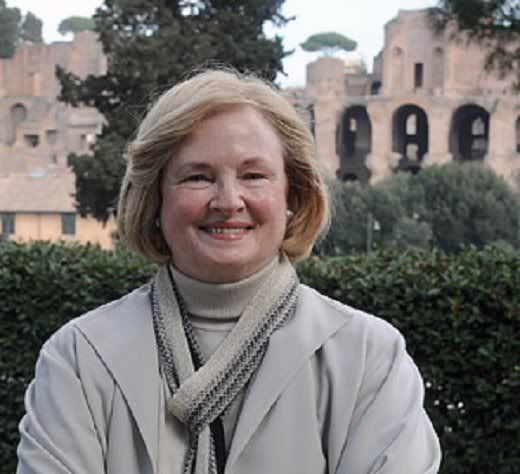 Ambassador Glendon in the garden of the US Embassy
Ambassador Glendon in the garden of the US Embassy
to the Vatican in Rome [CNS Photo).
U.S. ambassador expects Pope's
April visit to be thought-provoking
By John Thavis
Catholic News Service
ROME, Mar. 14 (CNS) -- The new U.S. ambassador to the Vatican said she expects Pope Benedict XVI's upcoming visit to the United States to be a thought-provoking event for Catholics, non-Catholics and international representatives.
Americans who listen carefully will discover in the pope a "world-class intellectual who can speak in terms that are simple and clear and readily accessible," Mary Ann Glendon said in an interview with Catholic News Service March 14.
The Pope can be expected to touch on some particular social issues, but his deeper message will be about conscience-forming and the values that underpin life in the church and in society, she said.
Glendon spoke in her office at the U.S. Embassy to the Holy See, which overlooks the imperial ruins of the Palatine Hill and an ancient Roman racetrack.
The ambassador took up her post in late February and hit the ground running. In addition to helping plan for the papal visit, she is already preparing a series of four major human rights conferences and considering an embassy-sponsored program to help fund and train Catholic health care workers.
Right now, the Pope's April 15-20 visit to Washington and New York looms as the biggest event on the embassy's radar.
Glendon said the Pope is going to the United States primarily as a pastor who "wants to speak to the deepest concerns of his flock." She noted that the United States has one of the world's largest Catholic populations -- a fact that's often overlooked.
She said the wide variety of events along the papal itinerary, from a meeting with Catholic educators in Washington to a stop at ground zero in Manhattan, will allow him to "share in the joys and sorrows, grief and anxieties" of the faithful.
But the Pope has always reached out to people of other faiths and people of no faith, so his visit will no doubt have a resonance that goes beyond the Catholic Church, she said.
Glendon, a Harvard University professor for many years, said she's been amazed at the Pope's smooth transition from scholar to universal pastor. On a wide range of faith and values issues, he is able to tailor his remarks to different audiences and make a connection, she said.
"Let me be quite clear. I think the kinds of things he says require close attention," she said.
"He does not dumb down, and I think that's his particular gift, that he is able to communicate very profound and complex ideas in accessible language," she said.
Those who make the effort and listen carefully while he's in the United States will be rewarded, she added.
Glendon will be at the White House April 16 when President George W. Bush meets the Pope for the second time. The ambassador described the encounter as a continued conversation between two global leaders who share a "close correspondence of interests."
She said the White House has identified three important topics on the pope-president agenda: peace in the Middle East, advancing interreligious dialogue and promoting human rights, especially religious freedom.
All three goals fall under what the White House calls the "common commitment to the importance of faith and reason," which has been a hallmark theme of Pope Benedict's pontificate.
Glendon said she wouldn't be surprised if the two leaders also discuss another common interest: finding creative new ways of partnership between public and private agencies in the fight against poverty, hunger and disease.
The ambassador said she didn't know if Iraq would be addressed in the talks. Reiterating a position taken by other U.S. ambassadors to the Vatican, she said that despite "initial differences" between the United States and the Vatican on Iraq "the Holy See is now fully supportive of U.S. efforts to rebuild the country and to establish peace in the region."
Glendon said the Pope will no doubt touch on politics in the broad sense -- the formation of consciences and "how we order our lives together" -- but not on partisan issues.
"Like Catholic social thought in general, the pope remains at the level of principle. He doesn't enter into the discussion of particular programs and policies," she said.
This is an approach that respects the freedom of the faithful, but also reminds them of their responsibilities, she said. After all, "the secular sphere, the sphere of politics, is the sphere where the laity is supposed to take the lead," she said.
Glendon said that she, like many people, is wondering what the Pope will say when he addresses the United Nations April 18.
Given his basic approach of nurturing what is sound and healthy in a group or organization, she thinks his focus will be on reminding the international community of the values on which the United Nations was founded.
That is a topic on Glendon's mind, too. Less than two weeks after the pope returns from the United States, the embassy is sponsoring a high-level conference on "Latin America and the Human Rights Project," which will look at the founding values behind the U.N.'s 1948 Universal Declaration of Human Rights.
The ambassador is plannng three more human rights conferences over the next eight months, to commemorate the U.N. declaration and as a buildup to the 25th anniversary of U.S.-Vatican diplomatic relations in 2009.
An embassy program to assist Catholic religious orders that provide health care is at the idea stage. It would aim to open a new chapter of U.S.-Vatican cooperation in needy areas.
"The Catholic Church is the world's largest development organization. It is the world's largest grass-roots provider of health care services, and the workers in the capillaries of this system know what is needed," she said.
Glendon said she's still making the transition from academia to diplomacy. She has served with Vatican delegations to international conferences and headed the Pontifical Council for Social Sciences, so she already knows the Vatican terrain.
The hardest part, she said, is the move from maximum freedom -- including freedom of expression -- as a private individual or university professor to the more controlled role of an ambassador.
"I now represent the values and interests and ideals of the United States. I do it with great pleasure, but it's a change," she said.
The simple freedom of physical movement is also different as a public official, she said.
"When you have to go everywhere with a pair of escorts, it kind of puts a damper on your desire to window-shop," she said.
[Modificato da TERESA BENEDETTA 15/03/2008 19:19] |
 14/03/2008 18:47 14/03/2008 18:47 |
|
| | | OFFLINE | | Post: 12.369 | Registrato il: 28/08/2005
| Utente Gold | |
|
    Benedict the Builder
Benedict the Builder
comes to America
By Deacon Keith Fournier
3/14/2008
 www.catholic.org/popevisit/coverage.php
[Catholic Online actually has an impressive banner for their Papal Visit coverage, but I haven't figured out yet how to reproduce it as it is not an image file
www.catholic.org/popevisit/coverage.php
[Catholic Online actually has an impressive banner for their Papal Visit coverage, but I haven't figured out yet how to reproduce it as it is not an image file
This is the kidn of article about the Holy Father one hopes will come out in the mainstream media - 'in abundance' - for a correct and concrete appreciation not only of Benedict XVI himself, but of how he and his Pontificate relate integrally and intimately to the figure and Pontificate of John Paul II, which most Americans relate to.]
"Habemus Papem", "We Have a Pope!" the Cardinal announced.
On April 19, 2005, Joseph Cardinal Ratzinger was elected as the 265th Pope. He chose the name of Benedict XVI, in honor of St. Benedict, the founder of Western monasticism, and of Benedict XV, who had presided from the Chair of Peter during World War I and was an ardent promoter of peace.
In the choosing of his name the signals were already being sent by this extraordinary man.
Pope Benedict XVI stepped forward onto the balcony overlooking St. Peters Square calling himself " ...a simple, humble worker in the vineyard of the Lord." The applause was uproarious. The joy filled not only that Square but the hearts of millions throughout the entire world who had prayed for this moment.
He continued " ...that the Lord can work and act even with insufficient means consoles me, and above all I entrust myself to your prayers. In the joy of the risen Lord, trusting in his permanent help, we go forward."
Then the questions began. All of them related to one singular question "Where will he lead us?"
Morning papers and television commentaries were besieged with alleged "answers". They ranged from ecstatic commentary to morose complaint, depending, as if often the case, on the speaker or writers positions on the so called "hot button" issues that the dominant media culture seems to be obsessed about.
However, like his beloved predecessor, the late Servant of God Pope John Paul II, Benedict XVI has not approached his ministry to the Church and the world in that way.
In fact, he approaches the world in an entirely different way. His way is to walk as a pilgrim along the ever ancient but ever new way of the Gospel of Jesus Christ as lived, loved, proclaimed and taught by the Catholic Church for over two millennia.
He, much like his predecessor, the Servant of God John Paul II, cannot be fit into the tired labels that so many incessantly try to fit him into. He is simply a faithful Catholic Christian.
He is also "Holy Father" to the flock of Jesus the Good Shepherd.
I must admit, I was overcome with joy, gratitude and profound hope for the future when I heard the news that day. I remember the events of those days vividly. I was visiting with a priest friend in Richmond, Virginia.
We were immersed in an intense conversation when another friend of mine, a Bishop of the Charismatic Episcopal Church, an ecclesial community not in full communion with the Roman Catholic Church, called me on my cell phone. "Have you heard?" he asked, "Habemus Papem, We have a Pope!" he proclaimed, hardly able to contain his own joy.
Who would have guessed that three years later, my Bishop friend would have left his ministry as a Protestant Pastor in order to follow the irresistible invitation of the Holy Spirit to come into the full communion of the Catholic Church.
He did so with his beloved wife Sandra, on November 12, 2006 at St. Benedict Catholic Church in Richmond, Virginia. Now, Randy Sly serves as the Washington Bureau Chief for Catholic Online and he will cover this historic visit of Pope Benedict XVI.
And I now live and serve the parish of that same priest friend in Richmond, Virginia, Father James Kauffmann. I moved to be closer to Washington D.C. in order to complete my coursework toward the PhD in Moral Theology at the Catholic University of America, one of the stops along this Pilgrim Pope's visit to America.
Like so many millions, my life has been profoundly changed by his ministry and the ministry of his beloved predecessor, Pope John Paul II.
But on that historic day, Father Kauffmann and I immediately turned the television on and, with the entire world, witnessed history. One day later, I realized just how significant it was that a Christian, then from another Christian community, had called to tell me, a Catholic Deacon, the "we" have a Pope.
I believe it was only the beginning of the movement of the Holy Spirit, under this pontificate, which is advancing a coming full communion of the whole Christian Church.
Pope Benedict XVI has stepped right into the trajectory walked with the Orthodox Church by his predecessor, John Paul II, but has advanced the hope, stepping it into a dialogue which may soon provide a vehicle for full communion.
What occurred in those momentous weeks, when Pope John Paul II passed to the Lord and Pope Benedict assumed the Chair of Peter, was nothing short of miraculous. First, the eyes of the entire world had turned to Rome while the giant, John Paul the Great, who had taught us all how to live, showed us how to embrace suffering with selfless love and offer it in union with Jesus Christ for the world.
Will we ever forget his last great message, given without words, when he stepped up to the window and was unable to even speak? Yet, we all knew what he was saying. It was beyond words. He had been reduced to love. His last blessing to us all also reduced the world to tears. Then, he showed us how to welcome death. He demonstrated the truth of the Christian claim by greeting death as a friend, the doorway to the fullness of communion with the eternal God.
In an event of historic magnitude, through the use of the very "new technologies" that Pope John Paul embraced and had written about several months before he went, in his own last words "home to his Father's house", the whole world became a participant in the events occurring in St. Peter's square.
There, the Catholic Christian Church, in all of the beauty of its ancient but ever fresh worship, commended Pope John Paul II to God. We mourned together, we wept together and we drew strength from the loving presence of the God who filled those precious hours with supernatural grace.
For those moments, it seemed as though the world stood still.
It was also during that profound passing of Pope John Paul II that then Joseph Cardinal Ratzinger spoke these words:
,"None of us can ever forget how in that last Easter Sunday of his life, the Holy Father, marked by suffering, came once more to the window of the Apostolic Palace and one last time gave his blessing "urbi et orbi" (to the Church and the world) We can be sure that our beloved pope is standing today at the window of the Father's house, that he sees us and blesses us."
I believe that one of the fruits of that very blessing was the selection of his friend, confidante, trusted theologian and beloved brother, Joseph Cardinal Ratzinger to occupy the Chair of Peter.
I also believe that Pope Benedict XVI has proven himself to be a master builder, rebuilding the Church so that she can engage the new missionary age of the Third Christian Millennium.
The plans laid by the Divine Architect, the Holy Spirit, for the Rebuilding of the Church and, through her, for the renewal of human culture, were placed on paper by his beloved friend and benefactor, John Paul II. He left behind a treasury of extraordinary work in the encyclicals, exhortations, letters and allocutions that he authored.
Now, Benedict the Builder has stepped up, supplied with some of the bricks and mortar, and continued the work. As I have written before, John Paul became, like the Savior he followed, lived and died as a "grain of wheat". Once fallen to the ground, we have begun to see the sprouting of the very "new springtime" that he proclaimed under the leadership of Pope Benedict. If there is anyone who understands the writings and the work of Pope John Paul, it is Pope Benedict XVI.
Anyone who has studied theology in the last two decades (and I am included in that number) have read Joseph Ratzinger and eaten from his rich bounty. He is one of the most brilliant, insightful and fecund theologians of the age.
He knows the burden that the Lord placed on the heart of his predecessor Pope John Paul II for "a New Evangelization" must lead to a massive rebuilding of the very infrastructure of faith in the Catholic Church. He understands the challenges that the Church faces as she walks forward to the future in this Third Christian Millennium are monumental.
However, he is a theologian of the highest order and ecclesiology, the study of the theology of the Church, is one of many of his greatest areas of knowledge. He is also a giant of a living faith which he believes must be lived, as well as proclaimed, in all the world.
He comprehends the legacy of Pope John Paul II and stands fully within the Tradition stretching forward and toward an authentic renewal of the Church. He also knows that only the Catholic Church, truly renewed, can effect the transformation of contemporary culture.
His predecessor left a legacy symbolized in pregnant phrases such as "adequate anthropology", "new humanism", "new eminism", "universal call to holiness", "true and authentic freedom", the "Church as communion", the call to the whole Christian Church to heed the prayer of Jesus "Ut Unum Sint", the "theology of the Body", "the theology of the gift" the "two lungs" of the Church, East and West, breathing together, the "new advent", the "new springtime"... and the list goes on.
However, these phrases not only summarized the themes of the last Pontificate but are the very material out of which this Pope named Benedict XVI is now building. This should come as no surprise, he helped his predecessor to develop and, in some instances, express them on the written page. He will now use them as mortar and bricks in this mission to rebuild the Church so that she can carry forward her mission to this Third Christian millennium.
Pope Benedict XVI, like Pope John Paul II, was present at and participated in the Second Vatican Council. He not only understands the authentic teaching of that Council but he has led the way in its proper implementation in many areas of life, both within the Church and in her mission to the modern world.
He also understands the way that the Council was hijacked in some circles, disregarded in others and absolutely misinterpreted in still others. He is a voice for dynamic orthodox and faithful Catholic Christian faith, practice, worship and life.
This Pope who will grace our Nation with this pastoral visit is a gift from God. He has been given to the Church of Jesus Christ right at the beginning of the Third Millennium, which is surely a new missionary age. He has been chosen in order to carry forward the plan of the Holy Spirit.
He is leading the Church forward by making her foundations once again solid. The, refortified and refreshed, the Church will do what she alone can do and what she has always done, go forward into a world that is waiting to be reborn as the presence of the Risen Christ.
In his homily prior to the convening of the conclave where he was chosen to fill the Chair of Peter, then Joseph Cardinal Ratzinger gave a prophetic insight into the challenges of this age:
How many winds of doctrine we have known in recent decades, how many ideological currents, how many ways of thinking...
The small boat of thought of many Christians has often been tossed about by these waves - thrown from one extreme to the other: from Marxism to liberalism, even to libertinism; from collectivism to radical individualism; from atheism to a vague religious mysticism; from agnosticism to syncretism, and so forth.
Every day new sects are created and what Saint Paul says about human trickery comes true, with cunning which tries to draw those into error (cf Eph 4, 14).
Having a clear faith, based on the Creed of the Church, is often labeled today as a fundamentalism. Whereas, relativism, which is letting oneself be tossed and "swept along by every wind of teaching," looks like the only attitude (acceptable) to today's standards.
We are moving towards a dictatorship of relativism which does not recognize anything as for certain and which has as its highest goal one's own ego and one's own desires."
Some have attempted to misuse this prophetic insight to paint him as rejecting the modern world. However, what he rejects, and rightly so, is the emptiness of modernity and post modernity.
What he proposes is a different path, not to the past, but to a future of hope and authentic freedom. It is truth alone which can pave that path to authentic human flourishing and freedom. That Truth can only be found in its fullness in Jesus Christ who still proclaims, through His Church, that He is the "Way, the Truth and the Life."
Jesus reminds every person in every age, that we can "know the truth" and that "the truth will set you free." In an age reeling from error and enchained in a misguided claim of enlightenment, Pope Benedict XVI shines the Light of the World.
Benedict has become a mouthpiece of the Risen Savior and His Vicar, to use a colloquial expression, right in the "nick of time".
Those who watch the early days of Popes tell us to watch for two things at the very beginning of their service, the name they choose and the content of their first homily for "clues" to their pontificate.
The choice of the name Benedict, after the great Abbot and the great voice for peace, was no accident. One of the young priests, who filled the airwaves during the first few days of his early Pontificate, noted that Joseph Cardinal Ratzinger visited Subiaco before all the events in Rome began. [On April 2, they day John Paul II died, to receive a Benedict prize for his writings about the dangers faced by Eruope today.]
There he prayed and rededicated himself to the work of the Church for the future. Interestingly, a short while later he would be called to occupy the chair of Peter and take the name Benedict.
Saint Benedict was born around the year 480 in Umbria, Italy. He is the father of Western Monasticism and co-patron of Europe (along with Saints Cyril and Methodius).
As a young man Benedict fled a decadent and declining Rome for studies in order to give his life entirely to God. He went to Subiaco. The cave that became his dwelling is now a shrine called "Sacro Speco" (The Holy Cave), which is a beautiful sanctuary for pilgrims.
Benedict lived a life of prayer and solitude and prayer for three years and studied under a monk named Romanus. His holiness drew other men and, soon, twelve small monasteries were founded. He later traveled to Monte Cassino, where he completed his "Rule for Monks."
From those Benedictine monasteries, an entire monastic movement was birthed which led to the evangelization of Europe, the birth and flourishing of the academy, the arts and what later became Christendom.
One of the greatest hopes of Pope John Paul II was for Europe to return to her Christian roots. His Holiness attracted the young. He left behind an entire generation who many Church leaders and even the media now refer to as "Generation John Paul II."
Many of the young priests, women religious and lay people whom we witnessed sharing their faith and stories on international television during those weeks of John Paul's passing and Benedict's elevation to the Chair of Peter are the fruit of Pope John Paul's wonderful work with the young.
He held numerous youth days in some of the most secularized cities in the world during his pontificate. Huge crowds of the young would gather to hear his proclamation of the timeless truth of the Gospel and the invitation of Jesus Christ to "Come, follow me"
It was no accident that the first World Youth Day under the pontificate of Pope Benedict XVI was already scheduled to occur in Cologne, Germany. The event held in August of 2005 brought record crowds of the young to greet the German Pope.
The young men and women who gathered in Germany heard from the first German Pope in 1000 years, Benedict XVI. He called them to holiness and to radical discipleship. He called them to the re-evangelization of Europe, indeed of the whole world.
He continued, without missing a beat, to proclaim the same inspired Gospel message and issue the same kind of challenging call to discipleship and missions that his predecessor and friend Pope John Paul II had proclaimed. And the young people took him into their hearts.
The crowds, contrary to some predictions, have not diminished under Pope Benedict XVI. They have actually increased. His next stop in evangelizing an entire new generation of young Catholic missionaries is Australia.
Benedict the builder understood that the task had fallen to him now to teach the next generation and then enlist them in the mission of the Church for this Third Millennium. He has passionately dedicated himself to the task.
Finally, I recall his first homily as Pope. In retrospect it gave more clues to what would occur during this wonderful Pontificate:
Dear Ones, this intimate recognition for a gift of divine mercy prevails in my heart in spite of everything. I consider this a grace obtained for me by my venerated predecessor, John Paul II. It seems I can feel his strong hand squeezing mine; I seem to see his smiling eyes and listen to his words, addressed to me especially at this moment: 'Do not be afraid!'
In that beautiful homily, he affirmed all that Pope John Paul taught and recommitted himself to continuing its implementation in continuity with the Tradition. He even emphasized the work of authentic ecumenism proclaiming:
Thus, in full awareness and at the beginning of his ministry in the Church of Rome that Peter bathed with his blood, the current Successor assumes as his primary commitment that of working tirelessly towards the reconstitution of the full and visible unity of all Christ's followers.
This is his ambition, this is his compelling duty. He is aware that to do so, expressions of good feelings are not enough. Concrete gestures are required to penetrate souls and move consciences, encouraging everyone to that interior conversion which is the basis for all progress on the road of ecumenism.
Theological dialogue is necessary. A profound examination of the historical reasons behind past choices is also indispensable.
But even more urgent is that 'purification of memory,' which was so often evoked by John Paul II, and which alone can dispose souls to welcome the full truth of Christ. It is before Him, supreme Judge of all living things, that each of us must stand, in the awareness that one day we must explain to Him what we did and what we did not do for the great good that is the full and visible unity of all His disciples.
The current Successor of Peter feels himself to be personally implicated in this question and is disposed to do all in his power to promote the fundamental cause of ecumenism.
In the wake of his predecessors, he is fully determined to cultivate any initiative that may seem appropriate to promote contact and agreement with representatives from the various Churches and ecclesial communities. Indeed, on this occasion too, he sends them his most cordial greetings in Christ, the one Lord of all.
In this moment, I go back in my memory to the unforgettable experience we all underwent with the death and the funeral of the lamented John Paul II. Around his mortal remains, lying on the bare earth, leaders of nations gathered, with people from all social classes and especially the young, in an unforgettable embrace of affection and admiration. The entire world looked to him with trust.
To many it seemed as if that intense participation, amplified to the confines of the planet by the social communications media, was like a choral request for help addressed to the Pope by modern humanity which, wracked by fear and uncertainty, questions itself about the future.
The Church today must revive within herself an awareness of the task to present the world again with the voice of the One who said: 'I am the light of the world; he who follows me will not walk in darkness but will have the light of life.'
In undertaking his ministry, the new Pope knows that his task is to bring the light of Christ to shine before the men and women of today: not his own light but that of Christ.
Pope Benedict XVI's ministry has been that of a builder, working in continuity with the 2,000 year teaching of the Catholic Church and helping to ensure that the proper understanding of the great treasure left by his predecessor, and the proper understanding of the Second Vatican Council becomes reality. He has also surprised many, particularly in the area of ecumenism.
I believe that he is leading the Church into a Catholic Millennium. Though things may at times seem dark, I believe even more than I did on that day when I heard those words "Habemus Papem" that we will see the springtime that his predecessor, our beloved Pope John Paul, prophetically anticipated.
I also believe that we are witnessing the beginnings of the coming full communion of the Church, East and West, as the "two lungs" on the One Body of Christ begin to breathe together again in order to animate this new missionary age.
We are beginning to witness the recovery of the Catholic academy through the rebuilding of some institutions almost lost to the Church and the building of new ones. We are seeing the flourishing of good, solid theological and philosophical work along with a flourishing of the arts and human culture, led by the Church, as it has been in ages past. He, like his namesake, is helping as well to bring the Christian influence back to Europe and beyond.
This mission task of building has not been easy. And, it will probably get even more difficult. The old adage is true; it always seems darkest before the dawn. Those who wanted to try to change the teaching and doctrine of the Church are deeply disappointed.
However, for all of us who hunger for a vibrant, faithful, dynamically orthodox Catholic Church, the source of all truth, the God who is Truth, has once again been true to his promise to Peter, "upon this rock I will build my Church and the gates of hell will not prevail against her".
The writings of this Builder Pope have only just begun.
His first two Encyclical letters, "God is Love" (Deus Caritas Est) and "Saved by Hope" (Spe Salvi) evidence the kind of vision of a unity of life which forms the foundation for the Churches Social teaching.
In the first, a deeply theological and profoundly spiritual teaching on love, he spent the second half of the letter giving a developed teaching on the demands and implications of social charity as an integral fruit of this theological virtue. In the second, a reflection on Biblical hope, he underscored as well its social expressions.
The message is clear; living out the Gospel has social implications. The ongoing work of the Redemption, accomplished in Jesus Christ, is now mediated through his Body the Church and is intended to effect a transformation of the world. [How apropos! See John Allen's new column posted in NEWS ABOUT THE CHURCH about 'evangelical Cahtolicism' and the lucubrations of a typical Catholic liberal about what he thinks the Msgisterium should be !]
Some sources indicate that he has completed and will soon release his Third Encyclical letter. It is to be a specifically social encyclical, a reflection on the 40th anniversary of Pope Paul VI's, "On the Progress of the People" (Popolorum Progressio).
This Pope is a scholar and understands the importance of His teaching office with a carefulness which properly becomes the Church's "theologian in chief".
It is probably no accident that the release of his Third Encyclical will coincide with the 40th anniversary of Populorum progressio. Some reports indicate that Pope Benedict will dedicate yet another Encyclical to "faith", the third of the theological virtues. Perhaps, as he did with love and hope, the other two theological virtues, he will, in his masterful way, show how faith is to be expressed in its social dimension. We will soon find out.
Sources also indicate that he will authorize a revision of the Compendium to be released following the release of the Encyclical. Throughout the Compendium the connection between living faith and authentic social concern is beautifully expounded.
The message is simple: Christians are called to inform their entire lives, personal, familial, social, cultural, economic and political, by their faith and thus to live, what the Compendium calls "...an integral and solidary humanism".
The Social teaching of the Catholic Church is meant to inform and influence social, economic, political and cultural life, primarily through the work of lay Christians who not only know it but have committed themselves to live by it, making it the foundation of their work in service to human society and the common good.
This teaching is called "social" because it speaks to human society and to the formation, role and rightful place of social institutions. It reveals principles and truths that can be known by all men and women - because they are revealed in the Natural law. These truths and principles are also confirmed by - and expounded upon in - Revelation.
Thus, this body of teaching is not simply "religious", in the sense that it is intended only for religious persons. It offers insights that are of tremendous value to all men and women- and it offers them for every nation.
The Introduction of the Compendium addresses all men and women with these words: "To the people of our time, our traveling companions, the Church also offers her social doctrine. In fact, when the Church ‘fulfills her mission of proclaiming the Gospel, she bears witness to man, in the name of Christ, to his dignity and his vocation to the communion of persons."
The reason for the social teaching is to serve the common good. This is another area of deep concern to this builder Pope. He is well aware of the separation between the faith professed by too many Catholics and the way they conduct themselves in Public Square. Clearly, he has his trowel in hand and is ready to rebuild an entire framework for reasserting catholic Social Teaching.
As Pope Benedict graces our Nation with this visit, each one of us should join together in fervent prayer for his health, protection and the continued assistance of the Holy Spirit for him as he discharges his office.
We should also rededicate ourselves to standing in solidarity with him, taking our own place in the Mission of rebuilding the Church.
Finally, we should give our assent to embracing fully the teaching of the Magisterium of the Catholic Church and redouble our efforts to live that teaching in every area of our lives, becoming missionaries in this new missionary age.
Benedict the Builder comes to America. "Be Not Afraid!"
=====================================================================
National Catholic Register - the orthodox Catholic journal, as opposed to the ultra-liberal National Catholic Reporter - also has a papal visit site now
www.pope2008.com/
and they have rightly chosen to reprint their editorial on the first-year anniverary of Benedict XVI's Pontificate. It remains valid as ever. It, too, places Benedict and his Pontificate in correct relation to John Paul II and his Pontificate.
Benedict and the Papacy
By the Editors
National Catholic Register
April 16-22, 2006 Issue
Benedict XVI is Peter’s successor, not John Paul’s.
A year ago, it seemed that John Paul had changed the papacy forever. Papal traditions for him were a like a carpenter’s toolbox — he grabbed the ones he needed, added what wasn’t there and left the others in the box.
Symbols like the papal coat of arms and the Holy Door were old and arcane. John Paul took them up and transformed them, using the coat of arms to deliver his Marian motto “Totus Tuus” and turning the Holy Door into a powerful symbol of renewal for the entire Church. He urgently needed to reach the youth and priests, so he invented World Youth Day and the annual Holy Thursday letter to priests, and added these tools to the box.
By using the papacy as he saw fit, John Paul consternated Vatican handlers and energized followers around the globe.
But he also put what looked like an impossible burden on his successor. The question would inevitably hover: Would the new pope try to imitate John Paul’s ways or distance himself from them? Either way, the next pope seemed destined to stay in the shadow of his predecessor.
Pope Benedict’s greatest accomplishment after one year as Pope seems to be that he has shown that the papacy was always far larger even than John Paul the Great.
Some of the traditions that John Paul retired, it seems, will never return. Benedict has declined to revive the papal tiara and other trappings of power. But he has restored others.
For instance, Benedict returned to the coat of arms tradition that popes have always used, but declined the John Pauline innovation of a papal motto, saying that his papacy stood for any and every expression of faith, hope and charity that is authentic. Similarly, he has returned to many of the old traditions of papal dress — red shoes, a stocking cap when it’s cold — simply, it seems, because that’s what popes wear.
Benedict will continue John Paul’s World Youth Day tradition, but has chosen not to continue the Holy Thursday letters to priests. In such things, the Holy Father seems to be asking himself not, “What would John Paul do?” but “What should the successor of Peter do?”
And in doing so, he has reminded us all that the papacy isn’t a human invention that draws its power from the persona of the pope, but a divine institution that draws its power from grace.
This has not gone unnoticed in the media. Time magazine reporter Jeff Israel noted it in August when Pope Benedict visited Cologne’s synagogue during World Youth Day.
He described what happened after the Pope’s entry and greeting. After a brief ceremony and remarks from a Holocaust survivor, the Holy Father spoke.
“But there was something happening that went beyond words,” wrote Israel. “It was in the way the Pope listened so intently to his hosts. It was the warm, two-hand embrace he shared with the young rabbi. It was in the somber cadence of his voice as he recounted Nazi atrocities, and the utter silence in the synagogue to hear his every breath.”
Israel said it only later dawned on him what was so powerful about the Pope’s presentation — powerful enough to earn a standing ovation from his hosts.
“Why didn’t Papa Ratzinger make even one small reference to his own experience?” he wrote. “John Paul II spoke about his own experiences every chance he could, about knowing Jews who were deported from his hometown in Poland. But perhaps Benedict, beyond a basic human shyness, also sees his role differently than his predecessor. He doesn’t want to impose his own persona on the pontificate. He doesn’t want his life’s story to represent the Church’s. He wants his words to educate as much as inspire.”
We thank God for Pope John Paul II. In him, we had a charismatic leader reawakening the Church at a time when we desperately needed that. But now we are grateful for Benedict, quietly educating the Church in the kind of mature faith he spoke about at the opening of the conclave — the “adult faith” that doesn’t depend on inspiration and charisma but on abiding friendship with Jesus.
John Paul’s signature phrase “Be not afraid!” thrilled us. But Benedict’s is just as full of hope. “The Church is alive,” he has said, “and the Church is young.”
He’s right. We are young. And we’re grateful to have him for our teacher, helping the Church continue grow into what God wants us to be.
[Modificato da TERESA BENEDETTA 14/03/2008 19:42] |
 15/03/2008 01:35 15/03/2008 01:35 |
|
| | | OFFLINE | | Post: 12.372 | Registrato il: 28/08/2005
| Utente Gold | |
|
THE POPE'S DAY, 3/14/08
 
The Holy Father began his official day by attending the fourth and final Lenten sermon by Fr. Raniero Cantalamessa, preacher of the Papal Household, at the Redemptoris Mater chapel of the Apostolic Palace.
Afterwards, he met with
- H.E. Carlos Federico de la Riva Guerra, new Ambassador of Bolivia, who presented his credentials.
Address in Spanish.
- Cardinal Walter Kasper, President of the Pontifical Council for the Promotion of Christian Unity
- Bishops of Haiti, Group 3, on ad limina visit
- Cardinal William Levada, Prefect of the Congregation for the Doctrine of the Faith.
Vatican Radio announced that Benedict XVI will offer a Mass for the late Archbishop Rahho of Mosul, on Monday, March 17, at the Redemptoris Mater chapel.
The Vatican also released the text of the telegram of condolence sent by the Holy Father on the death earlier today of Chiara Lubich, who founded the Focolari movement.
BOLIVIA: HARMONY TO OVERCOME ADVERSITY
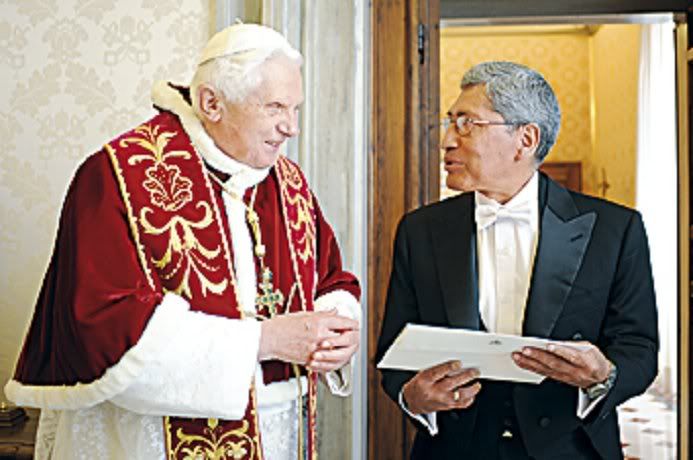
VATICAN CITY, 14 MAR 2008 (VIS) - The Holy Father today received the Letters of Credence of Carlos Federico de la Riva Guerra, the new ambassador of Bolivia to the Holy See.
At the beginning of his address to the diplomat, the Holy Father recalled how "Bolivia's deep Christian roots have sustained its people, accompanied the vicissitudes of its history and promoted a sense of respect and reconciliation, so necessary in the difficult moments the nation has had to face".
Bolivia, the Pope noted, "is experiencing a process of profound change which is producing difficult and at times worrying situations. ... We cannot remain indifferent when social tension is increasing and a climate unfavourable to understanding is spreading", he said.
In this context, he indicated that "the authorities ... and the leaders of political, social and civil organisations" must seek "to promote ... the conditions necessary for dialogue and agreement. This praiseworthy aim will be facilitated if all Bolivians contribute the best of themselves with openness and diligence and, at times, not without abnegation and sacrifice".
"In this way", he continued, "sincere and altruistic collaboration among individuals and institutions contributes to eradicating the evils afflicting the noble Bolivian people" who, he added, "have also often been affected by natural catastrophes which call for efficient measures and fraternal sentiments to help resolve their serious consequences".
"Rebirth", said Pope Benedict, "civil and social, political and economic rebirth always calls for disinterested effort and generous commitment in support of a people who are appealing for material, moral and spiritual assistance. The attainment of peace must be based on justice, truth and freedom, and on mutual co-operation, love, and reconciliation among everyone".
The Church, "faithful to her mission, is always ready to collaborate in pacification and in the human and spiritual development of the country, proclaiming her doctrine and publicly expressing her opinion on questions concerning the social order. Hence, while recognising the areas of responsibilities that are proper to the State, she sees her own duty as that of guiding the faithful, calling on them and on all of society to reject racial hatred, revenge and vendetta". Definitively, she calls on people to avoid "division, and to start down the path of solidarity of mutual trust and of respect for diversity".
Benedict XVI went on: "It is necessary for the defence and safeguarding of human rights to be firmly supported by ethical values such as justice, desire for peace, honesty and transparency, as well as by effective solidarity to correct unjust social inequalities.
"For this reason", he added, "instruction in what is morally right, in what is just and unjust (without which no society could survive), is incumbent upon education from earliest infancy. The family plays a decisive role in this task and hence must be given the necessary assistance to accomplish its mission and become the 'principal agency for peace', for the benefit of everyone".
The Pope concluded by appealing to God that Bolivia may witness the triumph of "the truth that seeks respect for others, even those who do not share the same ideas; the peace that joins with justice and opens the doors to harmonious and stable development; the good sense that strives to find balanced and reasonable solutions to problems; and the harmony that unites wills in overcoming adversity and achieving the common good".
POPE MOURNS DEATH
OF FOCOLARI FOUNDER
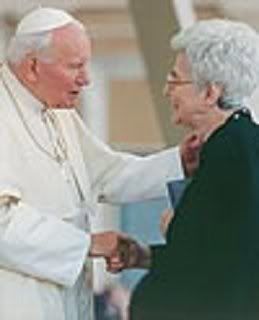 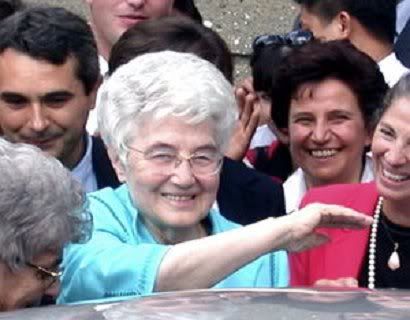
The Vatican today released the text of the telegram sent by the Holy
Father to Fr. Oreste Basso, co-president of the Focolari Movement, for the death at the age of 88 of the movement's founder Chiara Lubich. Here is a translation of the text:
REVEREND FATHER ORESTE BASSO
CO-PRESIDENT, FOCOLARI MOVEMENT
ROCCA DI PAPA
I HAVE LEARNED WITH DEEP EMOTION THE NEWS OF THE PIOUS DEATH OF MS. CHIARA LUBICH AT THE END OF A LONG AND FRUITFUL LIFE TIRELESSLY MARKED BY HER LOVE FOR THE ABANDONED JESUS.
IN THIS TIME OF EORROWFUL PARTING, I AM SPIRITUALLY NEAR WITH AFFECTION TO HER FAMLY AND TO THE ENTIRE 'OPERA DI MARIA' (WORK OF MARY)- THE FOCOLARI MOVEMENT WHICH BEGAN WITH HER - AS WELL AS TO ALL THOSE WHO APPRECIATED HER CONSTANT COMMITMENT FOR COMMUNION IN THE CHURCH, FOR ECUMENICAL DIALOG, AND FOR THE BROTHERHOOD AMONG ALL PEOPLES.
I THANK THE LORD FOR THE TESTIMONY OF HER EXISTENCE SPENT IN LISTENING TO THE NEEDS OF CONTEMPORARY MAN, IN FULL FAITHFULNESS TO THE CHURCH AND THE POPE.
AS I ENTRUST HER SOUL TO DIVINE GOODNESS SO THAT SHE MAY BE RECEIVED IN THE BOSOM OF THE FATHER, I HOPE THAT THOSE WHO KNEW HER AND MET HER, ADMIRING THE WONDERS THAT GOD ACCMPLISHED THROUGH HER MISSIONARY ARDOR, MAY FOLLOW IN HER FOOTSTEPS AND KEEP HER CHARISM ALIVE.
WITH THESE SENTIMENTS, I INVOKE THE MATERNAL INTERCESSION OF MARY AND GLADLY IMPART TO ALL THE APOSTOLIC BLESSING.
BENEDICTUS PP. XVI
Born in Trent, Chiara Lubich was deeply moved by the hours she spent in prayer with friends during the heavy bombardment of the region by Allied troops in World War II. In 1943, at the age of 23, she took private vows and began working on the creation of a new lay movement.
The Focolare movement, which took its name from the Italian word for "hearths," is dedicated to spiritual renewal in families and throughout the world. The group combines a strong Marian devotion with a commitment to ecumenical work, guided by the vision "that all may be one."
Focolare spread quickly during the late 20th century, gaining official recognition from the Holy See in 1962. Today the lay movement claims hundreds of thousands of followers throughout the world.
Chiara Lubich had become an influential leader in the Church. She was a close adviser to Pope John Paul II, who appointed her to participate as an observer at several meetings of the Synod of Bishops.
Suffering from declining health for the past year, Lubich was hospitalized this past weekend when she had difficulty breathing. When she did not respond to medical treatment she chose to return home for her final hours of life.
The funeral for Chiara Lubich will be held at the Roman basilica of St. Paul Outside-the-Walls on March 18. Cardinal Bertone will The Focolare movement will now face the choice of a new leader-- who, according to the movement's charter, must be a woman.
[ A separate story on Lubich has been posted in NOTABLES.]
[Modificato da TERESA BENEDETTA 18/03/2008 08:13] |
 15/03/2008 05:42 15/03/2008 05:42 |
|
| | | OFFLINE | | Post: 12.373 | Registrato il: 28/08/2005
| Utente Gold | |
|
 
  'Summorum pontificum'
'Summorum pontificum'
now in the official acts
of the Holy See
By Gianni Cardinale
Translated from
the 3/14/08 issue of

The motu proprio Summorum pontificum with which, last July 7, 2007, Benedict XVI validated the use of the traditional Mass in its 1962 version as an extraordinary rite of the Church has finally been published in the Acta Apostolicae Sedis [Acts of the Apostolic See], the official gazette of the Holy See.
The text of the document is in the volume of the Acta dated September 7, 2007 [although it has just been published (March 2008)] on page 777-781. On pages 795-799 is the text of the accompanying letter written by the Pope to all the Roman Catholic bishops of the world.
Last September 22, Corriere della Sera published a comment that the Motu Proprio was not official since it had not yet been published in the Acta. Prof. Alberto Melloni, who wrote the comment, called the Acta 'the organ which makes papal decrees take effect."
Melloni said the non-publication appeared to indicate 'the wise decision to temporaily keep in suspension a text that is already creating more problems than it was supposed to resolve."
What Melloni did not state is that the Motu Proprio was not in the Acta because of a timing technicality. As in almost all official gazettes, there is a lag time between the actual date of issuance of a Papal document and the date of publication in the Acta [not to mention the actual date that the issue itself comes out].
For instance, the Motu Proprio issued July 7, 2007, was due to have been published in the issue preceding the current one, because that issue carried all pontifical documents and nominations between May 27 and August 2, 2007. [In September 2007, when Melloni made his comment, the Acta was still publishing documents from 2006.]
The reason the Motu Proprio had a one-issue delay compared to its contemporaneous documents was probably the small changes that have been made to it, in what is now the definitive version.
First, Summorum Pontificum now has a subtitle, 'De uso extraordinario antiquae formae Ritus Romani' [Concerning the extraordinary use of the old form of the Roman Rite].
Then, in Article 1, the term 'conditiones' is replaced with the correct form 'condiciones' to mean 'conditions'.
In Article 3, the term 'plerumque' (most of the time) has been replaced with 'habitualiter' (habitually), without changing the dispositive substance of the article.
Far more concrete is the change made in Article 5,1 - which now reads (translated): "In parishes where there exists a group of faithful firmly (stabiliter) adhering to the preceding liturgical tradition, the parish priest must welcome their requests to celebrate the Holy Mass according to the rite of the Roman Missal published in 1962."
The original version used the term 'continenter', which means literally 'uninterruptedly' - interpreted by some parish priests and bishops to mean that groups entitled to request the traditional Mass would be limited only to those that were already constituted before the Motu Proprio came out, not as a consequence of it.
In Article 7, the change is in a verb - from 'non potest' (can not, is unable to) in the original to 'non vult' (does not waant to). The article now reads: "If a group of lay faithful among those described in Article 5,1 are not able to obtain satisfaction from their local parish priest to authorize their request [for the traditional Mass], the diocesan bishop must be informed. If he does not want to (non vult) provide for such a celebration, the matter must be referred to the Pontifical Commission 'Ecclesia Dei'."
For the record, the same issue with the Motu Proprio on the Mass also includes the earlier Motu Proprio by Benedict XVI re-establishing the two-thirds majority rule for electing a Pope. This earlier MP is dated June 11 and was made public on June 26.
This, too, has had two minor changes over the same term: the word 'nomina' (nominee) replaces the word 'cardinales' (cardinal), in the provision that the two candidates who get the most votes in the last inconclusive balloting have a passive vote, rather than an active vote, in the final balloting.
The reason for the change is that technically, it is not necessary to be a cardinal in order to be nominated and elected Pope.
=====================================================================
RORATE CAELI blog has updated their very convenient
side-by-side Latin-English presentation of Summorum Pontificum:
newcatholic.googlepages.com/summorum-latin-english-reg.pdf[Modificato da TERESA BENEDETTA 15/03/2008 18:29] |
 15/03/2008 19:53 15/03/2008 19:53 |
|
| | | OFFLINE | | Post: 12.394 | Registrato il: 28/08/2005
| Utente Gold | |
|
  HAPPY NAME DAY TO OUR BELOVED HOLY FATHER!
HAPPY NAME DAY TO OUR BELOVED HOLY FATHER!
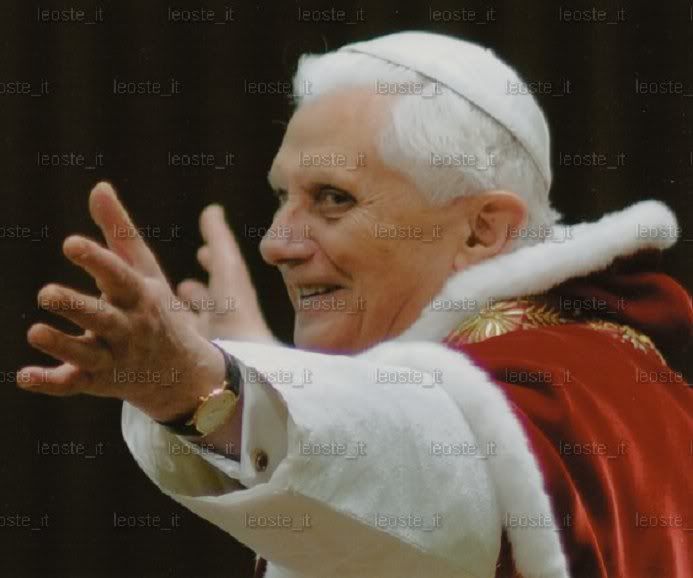
The Holy Father met today with
- H.E. Miltiadis Hiskakis, ambassador from Greece, who presented his credentials. Address in English.
- Cardinal Giovanni Battista Re, Prefect of the Congregation for Bishops
- Cardinal José Saraiva Martins, Prefect of the Congregation for the Causes of Sainthood.
- Cardinal Jean-Louis Tauran, President of the Pontifical Council for Inter-Religious Dialog
- Rev. Fr. Álvaro Corcuera Martínez del Río, Superior-General of the Legionaries of Christ
- Mario Morcone, Prefect of the Extraordinary Police Commissary of Rome.
THE POPE TO THE GREEK AMBASSADOR:
ON THE TREASURES OF HELLENISM AND CHRISTIANITY
The text delivered in English has been posted in HOMILIES, DISCOURSES, MESSAGES.
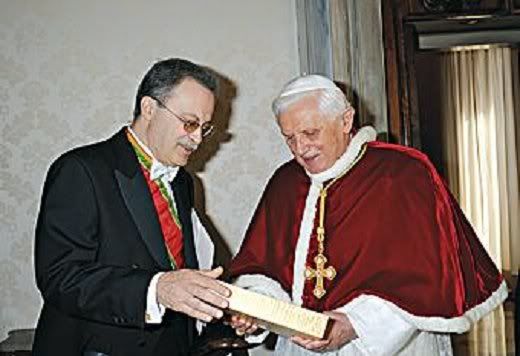
VATICAN CITY, 15 MAR 2008 (VIS) - The Holy Father today received the Letters of Credence of Miltiadis Hiskakis, the new ambassador of Greece to the Holy See.
In his English-language address to the diplomat, the Pope recalled the "valiant efforts" made by the recently deceased Christodoulos, archbishop of Athens and all Greece, "to mend the breach between Christians in the East and West". He also gave assurances of his constant prayers for the "fruitful ministry and good health" of Christodoulos' successor, His Beatitude Ieronymos.
After reiterating his "eagerness to work together as we travel the road towards Christian unity", the Holy Father recalled that "honesty and trust will be required from all parties if the important questions raised by this dialogue are to continue to be addressed effectively".
Referring to the forthcoming Jubilee Year marking the bi-millennial anniversary of the birth of St. Paul, the Pope indicated that it "will be a particularly auspicious occasion to intensify our ecumenical endeavours. ... This brilliant 'Apostle to the Gentiles' dedicated his energies to preaching the wisdom of the cross of Christ amidst the people of Greece, who were formed by the highly sophisticated Hellenistic culture".
"The vibrant exchange between Hellenistic culture and Christianity allowed the former to be transformed by Christian teaching and the latter to be enriched by Greek language and philosophy. ... Even today, visitors to Athens can contemplate Paul's words - now etched on the monument overlooking the Areopagus - which he proclaimed to the learned citizens of the 'polis'. He spoke of the one God in whom 'we live and move and have our being'".
St. Paul's words, said Pope Benedict, "still resound in the hearts of men and women today. They can help our contemporaries to appreciate more deeply their human dignity, and thus promote the good of the entire human family. It is my hope that the Pauline Year will become a catalyst that will spark reflection upon the history of Europe and stir its inhabitants to rediscover the inestimable treasure of values they have inherited from the integral wisdom of Hellenistic culture and the Gospel".
Benedict XVI went on to thank the ambassador "for the assurance of your government's resolve to address administrative issues concerning the Catholic Church in your nation. Among these, the question of its juridical status is of particular significance. The Catholic faithful, though few in number, look forward to the favourable results of these deliberations. Indeed, when religious leaders and civil authorities work together to formulate fair legislation in regard to the life of local ecclesial communities, the spiritual welfare of the faithful and the good of all society are enhanced".
Turning to consider the international arena, the Pope commended "Greece's efforts to promote peace and reconciliation, especially in the surrounding area of the Mediterranean basin".
In conclusion the Pope recalled "the devastation caused by the wildfires that raged through Greece last summer. I continue to remember in my prayers those who were affected by this disaster", he said.
======================================================================
Continued Jewish protests
on Good Friday prayer
Rome, Mar. 14, 2008 (CWNews.com) - Some Jewish leaders continue to lodge protests against a papal revision of the prayer for Jews included in the traditional Good Friday liturgy.
In an interview for the ANSA news agency, the head of the International Jewish Committee on Interreligious Consultations, Rabbi David Rosen, said that his organization is not satisfied with the new text, released in February on directions from Pope Benedict XVI
He said that a delegation of rabbis from Jerusalem have delayed a planned trip to the Vatican to protest the prayer.
Pope Benedict revised the prayer in answer to complaints that the text - used only in Latin, in Good Friday services following the traditional liturgy - referred to the "blindness" of Jews. But some Jewish leaders have complained that the Pontiff did not eliminate the prayer that the Jewish people will recognize Jesus Christ as their savior.
Rabbi Rosen said that he had received assurance that Cardinal Tarcisio Bertone, the Vatican Secretary of State, will soon release a statement of clarification, saying that the Good Friday prayer is not an invitation for Catholics to undertake aggressive efforts to convert Jews.
[Modificato da TERESA BENEDETTA 18/03/2008 08:30] |
 15/03/2008 20:44 15/03/2008 20:44 |
|
| | | OFFLINE | | Post: 12.395 | Registrato il: 28/08/2005
| Utente Gold | |
|
   TWO VIEWS ON THE NEW GOOD FRIDAY PRAYER -
TWO VIEWS ON THE NEW GOOD FRIDAY PRAYER -
AND BOTH ARE AGAINST IT
Commonweal Magazine
March 14, 2008
But did we really expect anything else from Commonweal - the emblematic organ of the faux 'spirit of Vatican-II??
View #1
By John T. Pawlikowski, OSM
The writer is the director of the Catholic-Jewish Studies Program at the Catholic Theological Union in Chicago, and president of the International Council of Christians and Jews.
On February 5, the Vatican published Pope Benedict XVI’s updated Tridentine-rite Good Friday prayer for the Jews.
“Let us also pray for the Jews,” it reads in Latin. “May the Lord our God enlighten their hearts so that they may acknowledge Jesus Christ, the savior of all men.”
It continues, “All-powerful and everlasting God, you who want men to be saved and to reach the awareness of the truth, graciously grant that with the fullness of peoples entering into your church all of Israel may be saved. Through Christ our Lord, Amen.”
The controversy over an appropriate prayer for the Jewish people in Catholic liturgy has been with us since the time of John XXIII. Even prior to the Second Vatican Council, he removed the term “perfidious” from the Good Friday prayer.
Then in 1965, just before Vatican II’s “Declaration on the Relationship of the Church and Non-Christian Religions” ( Nostra aetate), John’s successor, Paul VI, eliminated the negative language about the Jews (the reference to their “blindness,” for example) from the Good Friday liturgy, while leaving the call for conversion intact.
The 1970 Missal, the definitive response to the liturgical changes mandated by Vatican II, further revised the 1965 prayer. It acknowledged the Jewish people’s faithfulness to God, but left open the eschatological resolution of the apparent conflict between Christ’s universal salvific action and the Jews’ ongoing covenantal com-mitment.
The 1970 prayer is clearly in the spirit of Nostra aetate, which totally rejected almost two millennia of Christian theological perspectives on the Jews, but failed to offer a definitive replacement.
That task was left to subsequent generations of theologians and biblical scholars, work that has in fact been taking place since the end of the council.
Two such ongoing efforts are the Christ and the Jewish People consultation, jointly sponsored by Boston College, the Pontifical Gregorian University, the Catholic Theological Union, and the Catholic University of Leuven with the encouragement of Cardinal Walter Kasper; and the multiyear study project on Paul and Judaism at the Catholic University of Leuven.
In an official international Vatican-Jewish dialogue in Venice in 1977, Tomaso Federici, a lay scholar highly respected in Vatican circles, proposed that in light of Nostra aetate, Catholicism should formally renounce any proselytizing of the Jews. The official published version of his paper, which appeared several years later, was altered to call for a rejection of “undue” proselytizing.
A few years ago, Cardinal Kasper wrote that there is no need to proselytize Jews because they have authentic revelation and because, in the understanding of Vatican II, they remain in the covenant. But he did add that Catholicism must also retain a notion of Christ’s universal salvific work. Unfortunately, he never pursued how these two theological affirmations might be integrated.
The controversial 2002 statement, “Reflections on Covenant and Mission,” which was released as a study document by the U.S. Conference of Catholic Bishops’ Secretariat for Ecumenical and Interreligious Affairs and the National Council of Synagogues, called for an end to proselytizing Jew.
It drew praise from Cardinal Edward I. Cassidy, Kasper’s predecessor at the Pontifical Council for Promoting Christian Unity, but was strongly critiqued by Cardinal Avery Dulles in America (October 14, 2002). The month before, an ecumenical scholars’ group on Christian-Jewish relations published “A Sacred Obligation.” It also called for an end to proselytizing.
The discussion about the new prayer for the Jews began last summer, in the context of Pope Benedict’s motu proprio on the Latin liturgy (see Commonweal, August 17, 2007).
Groups long associated with efforts after Vatican II at Christian-Jewish understanding - such as the Committee of German Catholics and Jews, the International Council of Christians and Jews, the Austrian Coordinating Council on Jewish-Christian Relations, and the North American Council of Centers on Christian-Jewish Relations-sent messages to the Vatican urging that the Latin version of the 1970 Good Friday prayer be inserted into the 1962 Missal.
Important Roman Catholic leaders like Cardinal Karl Lehmann of Germany and the U.S. bishops’ conference weighed in, along with several Jewish groups, including the Vatican’s official Jewish dialogue partner, the International Jewish Committee for Interreligious Consultations and the Chief Rabbis of Israel.
Concern over the prayer was shared equally by Christians and Jews. It was not, as the popular press has frequently suggested, a one-sided Jewish protest.
In late August, Vatican Secretary of State Cardinal Tarcisio Bertone publicly acknowledged the concerns and suggested that making the 1970 prayer the common text for both missals might be the best solution. But something happened to push that proposal off the table. Pope Benedict, it was announced, would compose a new prayer.
The new prayer has engendered much controversy. Protests have come from many countries and groups. The Italian rabbinical association has decided to suspend any Catholic-Jewish dialogue. While the Pope’s new prayer removes the most offensive language from the 1962 Missal, it calls on Jews to acknowledge Jesus Christ as savior. [Excuse me! The prayer is addressed to God, and it says literally “May the Lord our God enlighten their hearts so that they may acknowledge Jesus Christ, the savior of all men.” That is not calling on the Jews to 'acnowledge Jesus Christ...' etc. - it is asking God to make it happen, and as with every prayer to God, it is both accompanied by an 'Amen' - So be it! - and an implicit 'Thy will be done' - if, as, when and how you will it, Lord! The same attitude made explicit in prayers for eventual Christian reunification. Once again, the hope expressed is eschatological, not 'immediate' conversion implying any 'active' effort to convert Jews to Christianity.]
In reflecting on the controversy, four points need to be made.
First, inter-religious dialogue is an encounter of people, not merely an academic theological exercise. In the spirit of the Vatican’s own 1974 document “Guidelines on Catholic-Jewish Relations,” it is vital for Catholics to understand why the issue of conversion strikes such a raw nerve in the Jewish community, particularly in light of the long history of Christian anti-Semitism and the Holocaust.
In fairness, Jews must also appreciate that mission is at the core of Christian identity. In the end, authentic dialogue and understanding must involve mutual learning. The new prayer has no sense of this.
Second, Jews need reassurance that the use of the prayer will not generate new programs aimed at proselytizing Jews. Cardinal Kasper and others have attempted to set the prayer in an eschatological context, particularly in light of Romans 11. Whether such a reading will be convincing remains an open question.
There is little hope of changing the prayer itself at this point. But it is possible to leave the issue as strictly a matter of a prayer, rather then using it to initiate a new missionizing program.
Third, a prayer on Good Friday, especially given that historically this day often provoked Christian violence against Jews, should not become the occasion of a new theological understanding of the relationship between the church and the Jewish people. Unfortunately, the new oration could have been written before Vatican II.
The 1970 prayer is superior because it affirms Jewish faithfulness without settling the question of how this might affect Christian notions of salvation. The theology behind this not-so-new prayer does not take into account what Gregory Baum, one of the drafters of Nostra aetate, called the council’s radical transformation of ordinary Catholic teaching on the Jews, the most striking turnabout to emerge from Vatican II.
Finally, at this critical moment we need to recommit to the Christian-Jewish encounter. Silence will get us nowhere. Various Christian and Jewish groups, including the USCCB, have called for continued dialogue, despite the pain the papal prayer has caused.
Two special opportunities present themselves in the near future. The October synod of bishops in Rome will focus on the Bible and has placed the issue of Jewish-Christian relations on its preliminary agenda.
And the upcoming jubilee-year celebration of St. Paul, which begins June 28, offers the possibility of bringing popular attention to the emerging view of Paul as someone with a quite positive understanding of Judaism, not merely as an opponent of Jewish law. Both avenues need to be pursued in earnest as a countermeasure to the negative impact of the new prayer.
The situation regarding the prayer for the Jews in the 1962 Missal has been handled badly from start to finish. But the controversy may still open the possibility of new learning and renewed commitment to Catholic-Jewish reconciliation.
=====================================================================
First, I would be very interested to know what, if any, instances there have been in recent memory of Catholics proselytizing the Jews, much less any 'new program aimed at proselytizing the Jews'. The Jews are such a close community it would be difficult to imagine, in our day, any organized attempt to covnert the Jews to Christianity. Any such efforts, I imagine, would be done only on a person-to-person basis.
We are not living in the period following the Spanish Reconquista when the Jews in Spain were coerced to profess Christianity or be persecuted, exiled or even killed! Was there any other similar Christian proselytism of the Jews after that?
Second, for someone like Fr. Pawlikowski to practically ignore Cardinal Kasper's explanation of the sense of the new prayer is quite surprising - or perhaps not, given that he may have a built-in liberal bias.
I, too, in my simple way, had originally thought that the best solution would simply have been to use the Latin version of the Paul VI prayer. But after Cardinal Kasper's short, simple and straightforward explanation of the changes that Pope Benedict effected, I not only saw immediately and clearly the eschatological sense - as opposed to an active intent to convert the Jews - of the new prayer, but also its theological and liturgical logic.
Third, I do not see how the new prayer in any way goes against Nostra aetate. Rather, it is faithful to the letter and spirit both of Nostra aetate - about which no one need remind Benedict XVI, since he has cited it so abundantly in the past - and Dominus Iesus.
Nostra aetate has not cancelled out our Christianity, and the new prayer does not make any 'claim' for Christianity and Christians as a chosen people, but only for Christ, that he is the Savior of the world.
=====================================================================
VIEW #2
By Judith Banki
She is the director for special programs at the Tanenbaum Center for Inter-Religious Understanding in New York City.
Metaphors, by definition, can only approximate reality, but they can also illuminate it.
My own visual metaphor for Catholic-Jewish rapprochement, after a half-century of involvement, is a road, or rather, a pathway -narrow, but hardly straight: twisted, thorny, very slippery indeed, strewn with pitfalls, its end uncertain.
And yet, a small but deeply committed group of Catholics (some mandated by the church) and Jews, spurred by historical realities and encouraged by opportunities created by the Second Vatican Council, have chosen to trudge it together.
Clergy and laypersons, scholars and educators, theologians and historians, men and women, have worked to overcome deeply entrenched prejudices, some rooted in religious teachings them-selves, and to advance mutual understanding through official and unofficial dialogues, academic programs, joint study, and cooperative action toward shared goals. Along the way, they have developed real friendships and some genuine trust.
They have also encountered a few major roadblocks and shifts in direction. Will the Good Friday “Prayer for the Conversion of the Jews” just issued by Pope Benedict XVI prove to be another bump in the road or a complete reversal in direction, a U-turn in Catholic-Jewish relations?
The internal Catholic debate on this question has been thoughtfully summarized by Fr. John Pawlikowski. Aware that it is an internal debate involving the church’s theological self-understanding, the response by Jews has been muted.
As noted, the Italian rabbinical association has voted for a “pause” in Catholic-Jewish dialogue. Other Jewish groups have publicly expressed “disappointment,” but have declared their commitment to continued dialogue.
Much will depend on whether the new prayer is interpreted eschatologically, a hope for the end of days, or as a mandate for a renewed mission to the Jews. This question is currently unresolved, but there is no current Catholic program or policy to convert Jews, and there has not been one for some years.[But why do the critics choose to ignore, or at least, downplay any significance to the Vatican's explanation? The prayer expresses an eschatological hope. Period!]
Still, those who have insisted that Jews stay out of internal Catholic theological debate should remind themselves that the practical consequences of Christian “theology” have led to persecution and pogroms in the past, and that concern about what Christians learn, teach, preach, and pray about Jews is motivated more by self-protection than by intrusiveness. It is no accident that for many centuries the most dangerous day in the year for Jews in Christian Europe was Good Friday.
Was it Karl Barth who said that Christians should only “do” theology in the presence of Jews? The meaning comes clear in the context of this controversy. The “disconnect” between theology and its historical applications has had disastrous consequences.
Theology does not take place in a vacuum. Even prayerful hopes free of negative and hostile attributes about the objects of the prayer have had an impact on the lives and destinies of these “others.”
[First of all, I do not know how many Catholics actually attend Good Friday liturgy - especially since it is the one day on which no Mass is celebrated and it comes on a weekday.
I doubt that many more habitually attend even one of the two Masses said on Maundy Thursday. Personally, I was never aware of the Good Friday prayers until the whole controversy started because, growing up, this Good Friday liturgy was not performed in the churches I went to. What we had on Good Fridays was, instead, a three-hour long series of sermons/meditations on the Seven last Words, followed by a Good Friday 'interment of Christ' procession (Santo Entierro, in Spanish).
So how can a prayer expressed in positive Biblical terms, a prayer which certainly, only a few Catholics are aware of - out of the more than a billion there are in the world - possibly lead to an outbreak of anti-Semitism, as Ms. Banki appears to suggest? Even the Nazis cited racist ideology, not religion, to justify their anti-Semitism.
I seriously doubt that the Good Friday prayer as it was in the Missals from the time of the Council of Trent to John XXIII's revision 'caused' Catholics to be anti-Semitic! Rather, the prayer itself was more likelythe expression of a latent anti-Semitism that had been present since the early Church, because of the folk belief that Jews 'killed' Christ, although the prayer never did and does not accuse the Jews of deicide, but only of 'blindness' in not recognizing the Messiah.]
Like his predecessor, Benedict XVI has reached out to the Jewish community in friendship on several occasions. This newly issued prayer for the conversion of the Jews may be intended to restate the fundamental message of the church regarding the universal salvific uniqueness of Christ.
But for many Jews the very word “conversion” will recall campaigns, not prayerful hopes: the Crusades, the forced disputations and sermons, the expulsions, the Inquisition, the ghettos. [But the word 'conversion' does not appear in the prayer at all!]
But to allow only these bitter memories to determine our response to the Pope’s prayer would be a big mistake. We live in different times; the church has disowned coercion and affirmed religious liberty as a human right. [There you have it! Moreover, Christians are now more universally conscious that Jesus himself was a Jew, and a practising Jew, so for a Christian to be anti-Jewish would not make sense at all.]
But appropriate or not, the memories will come. Jews have long memories, Judaism itself is steeped in memory, and, as Fr. Edward Flannery observed some years ago, Christians have torn from their history books the pages that Jews have memorized.
To recognize this history without being mired in it is a task incumbent on both Catholics and Jews. What I have called “missed opportunities” and others have called “teaching moments missed” remain as bumps in the road.
It is interesting that the traditionalists, for whom this prayer in Latin was newly issued, objected to the removal of the negative language about Jews. [Not all traditionalists - only unregenerate Lefebvrians!]
Although they are a small minority within the Catholic community, does not their persistent anti-Judaism, indeed, anti-Semitism, require a correction from church authority? [But the objecting unregenerate traditionalists themselves claim to be distinct and separate from the Roman Catholic Church! They do not recognize the authority of this Pope nor any of the Popes after Vatican-II, because they do not accept that anything Vatican-II decreed is valid!]
Might the prayers for conversion of the Jews and others also incorporate the language of the church’s affirmation of religious freedom?
I do not believe that the friendships between Catholics and Jews that have developed over years of dialogue and joint study will be affected by the introduction of the Good Friday prayer. Mine have not, because the concerns of Catholic colleagues have been forthright and reassuring. But the trust is in one another, not in the Church as an institution.
Personally, I am not concerned about whose faith will prevail at the end of days; I am concerned that we walk the path together, side by side, in partnership until the end of days. [Obviously, Ms. Banki speaks as a Jew, and is being faithful to her faith, as she should.]
[Modificato da TERESA BENEDETTA 15/03/2008 21:57] |
 16/03/2008 13:05 16/03/2008 13:05 |
|
| | | OFFLINE | | Post: 12.406 | Registrato il: 28/08/2005
| Utente Gold | |
|
PALM SUNDAY MASS AND ANGELUS
 
 A full translation of the Holy Father's homily at Mass and his words at the Angelus today has been posted in HOMILIES, DISCOURSES, MESSAGES.
A full translation of the Holy Father's homily at Mass and his words at the Angelus today has been posted in HOMILIES, DISCOURSES, MESSAGES.
At 9:30 a.m., the Holy Father presided at the solemn liturgical celebration of Palm Sunday and the Passion of the Lord at St. Peter's Square.
The Pope blessed the palms and olives, and following a procession with the blessed fronds, he celebrated Mass.
Special participants in today's assembly were the youth of Rome and other parts of Italy for the diocesan celebration of World Youth Day which culminates in the international event to be held in Sydney, Australia, from July 15-20, with the participation of Pope Benedict.
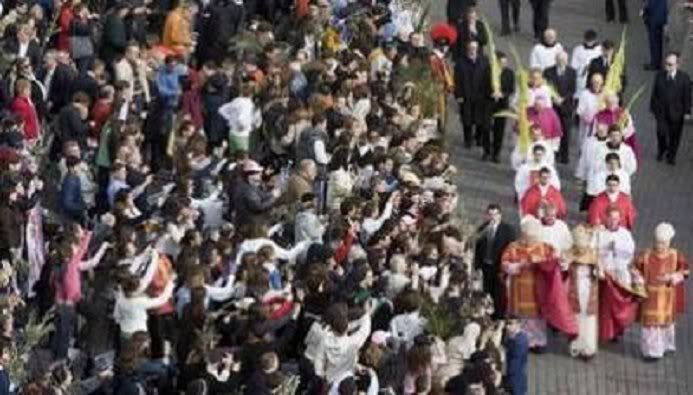
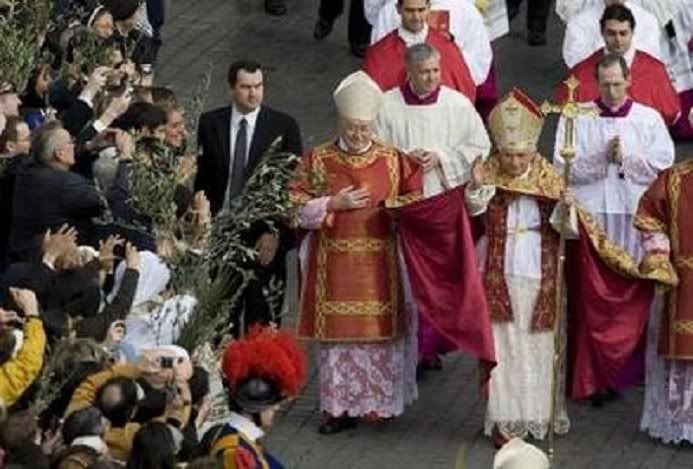
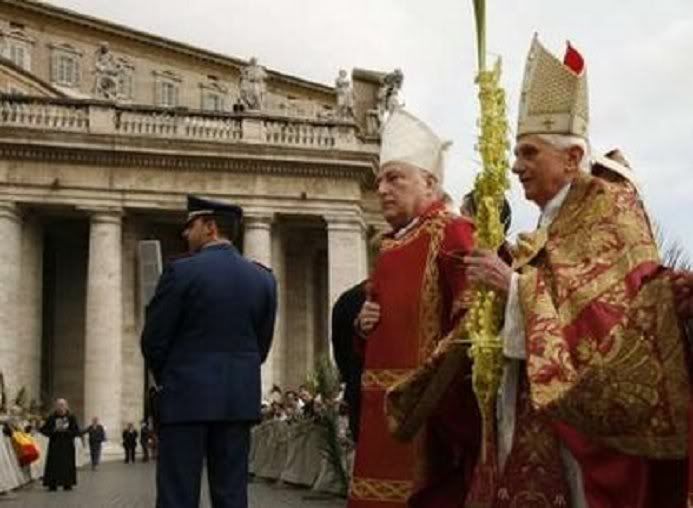
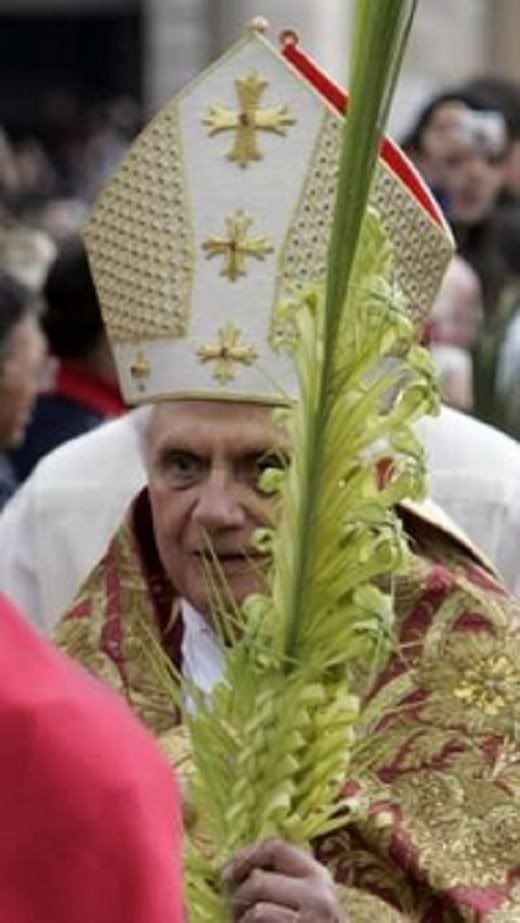
The Mass ended in time for the Holy Father to lead noonday Angelus prayers. He preceded the Marian prayer with a message about the death of Archbishop Rahho in Iraq. Here is a translation of his words:
At the end of this solemn celebration, in which we meditated on the Passion of Christ, I wish to remember the lamented Archbishop of Mosul of the Chaledeans, Archbishop Paulos Faraj Rahho, who tragically died recently.
His beautiful testimony of faithfulness to Christ, to the Church and his people, whom he did not abandon despite numerous threats, impels me to raise a strong and heartfelt cry: Enough of the killings, enough of violence, enough of hatred in Iraq!
At the same time, I raise an appeal to the Iraqi people, who have borne for five years the consequences of a war which has provoked such disorder in their civic and social life: Beloved Iraqis, lift up your heads and be yourselves the primary rebuilders of your national life! May reconciliation, forgiveness, justice and respect of civil coexistence among tribes, races, and religious groups be the fraternal and common way to peace in the name of God.
Then, the Pope had these words for the youth, which he later substantially repeated in English:
And now, dear brothers and sisters, I renew my cordial greetings to all of you. In particular, I address myself to the youth, who have come from many parts of the world, on the occasion of World Youth Day, which the beloved Servant of God John Paul II had wished to link to Palm Sunday.
My thoughts at this time go to Sydney, Australia, for the great encounter that I will have with the youth of the world from July 15-20. I thank the Australian bishops conference, particularly Cardinal Pell, Archbishop of Sydney, and his co-workers, for all the work that they have been doing with such commitment.
I am similarly grateful to Australian authorities, both federal and state officials, for the generous support they have given to this important initiative.
Let us see each other in Sydney.
Interestingly, among the Anglophone wire services, Reuters filed a surprisingly good story about the Pope's homily, whereas AP and AFP, which filed later stories, chose to focus on the words appeal for Iraq.
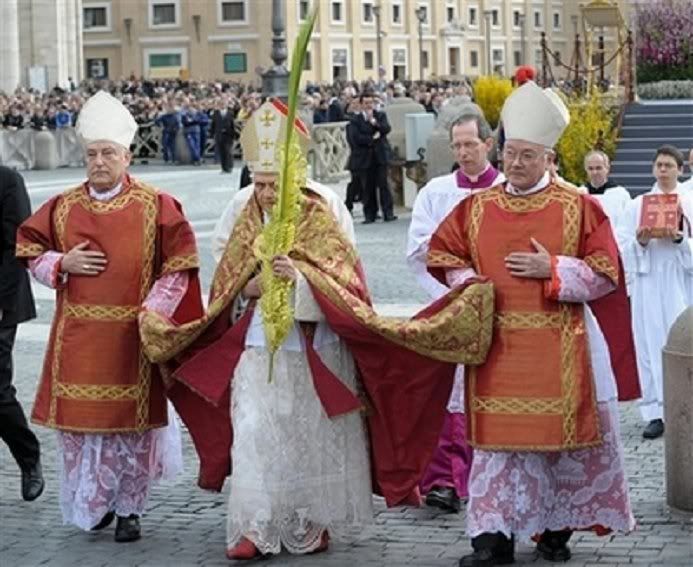
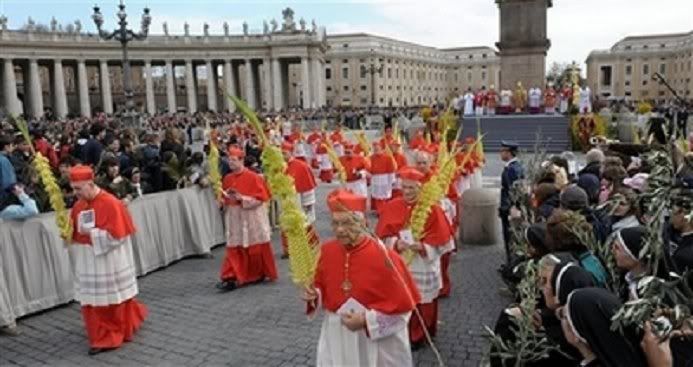
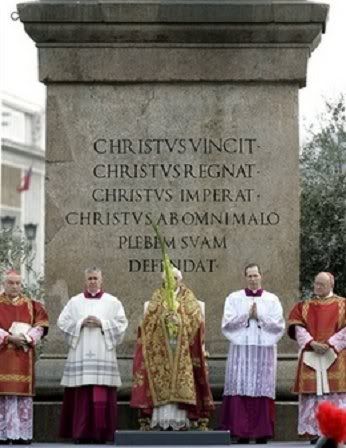 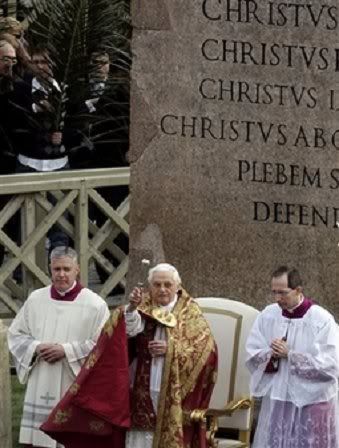
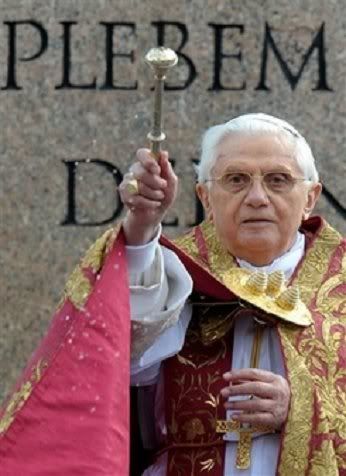 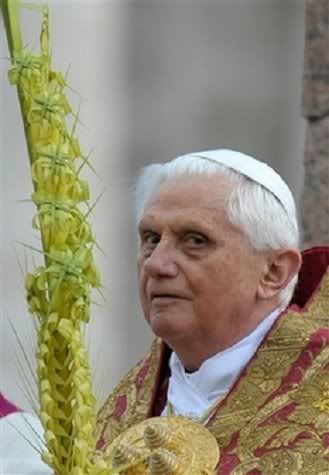
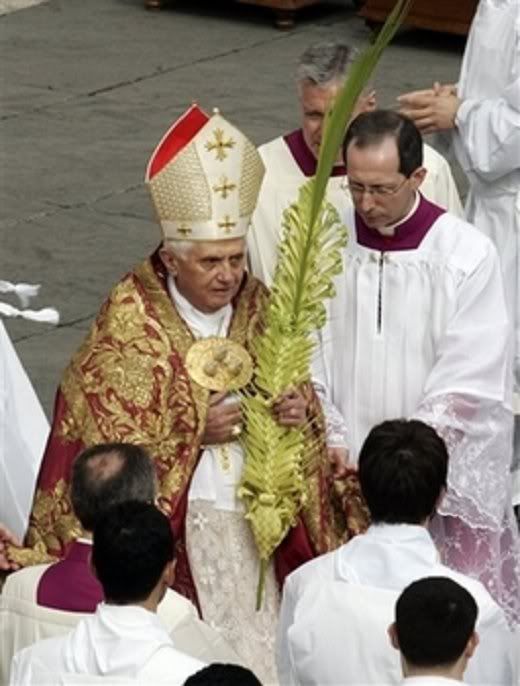 Pope calls for self-examination
Pope calls for self-examination
on Palm Sunday
By Deepa Babington
VATICAN CITY, Mar. 16 (Reuters) - Pope Benedict called on Catholics to examine whether worldly desires had corrupted their faith, as he commemorated Palm Sunday before a crowd holding palm fronds and olive branches.
In a service to mark Christ's triumphant entry into Jerusalem a week before being crucified, Benedict asked the faithful to remember that greed was also a form of idolatry that could creep into their daily life.
"Is our faith pure and open enough?" said the Pope, seated on a dais in front of St. Peter's Basilica, wearing red, gold and white vestments. "Do we perhaps let idols, through various means, enter in the world of our faith?"
Speaking to thousands of pilgrims packed in St. Peter's Square on a cloudy day, the Pope recalled Christ's anger on finding money changers and merchants in a Jerusalem temple courtyard as a reminder of greed that must be rooted out.
Presiding over the third Palm Sunday of his pontificate -- John Paul II died just after Easter in 2005 -- Benedict led a procession of cardinals and bishops carrying palm fronds in St. Peter's Square to start the celebrations.
Palm Sunday marks the start of Holy Week, with the eight days leading to Easter Sunday the most intense in the Roman Catholic Church's liturgical calendar.
On Holy Thursday, the Pope will preside over two masses recalling Christ's Last Supper with his apostles.
On Good Friday he will hold two services commemorating the passion and death of Christ, including a Via Crucis (Way of the Cross) procession around the ancient ruins of Rome's Colosseum.
He then presides at an Easter Eve mass on Saturday and caps the week off with Easter Sunday celebrations in St Peter's Square when he delivers his twice yearly Urbi et Orbi (to the city and world) blessing and message.
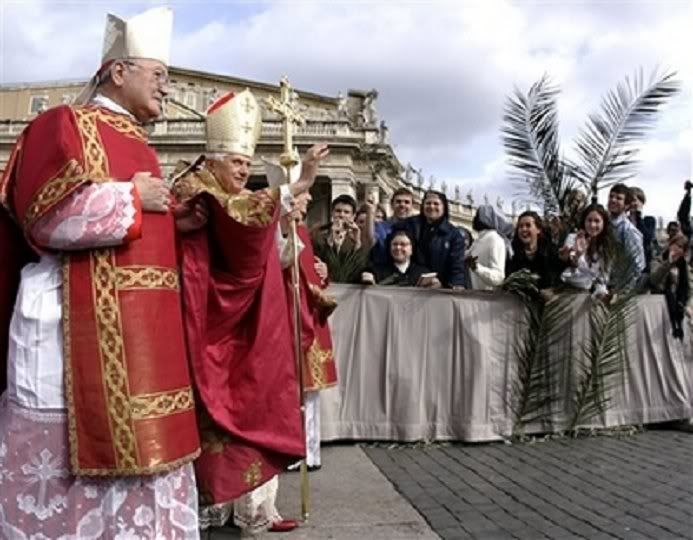
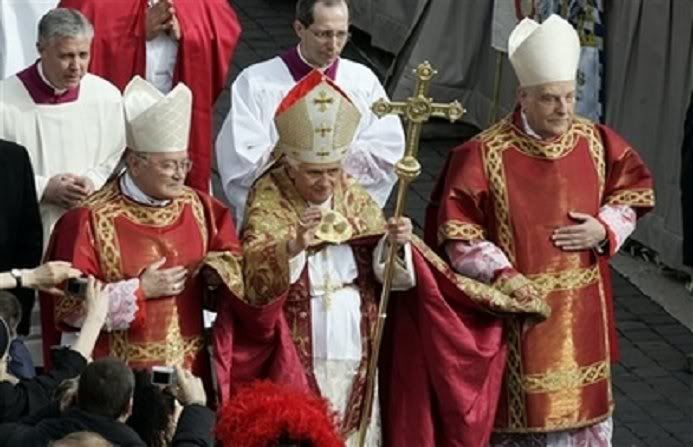
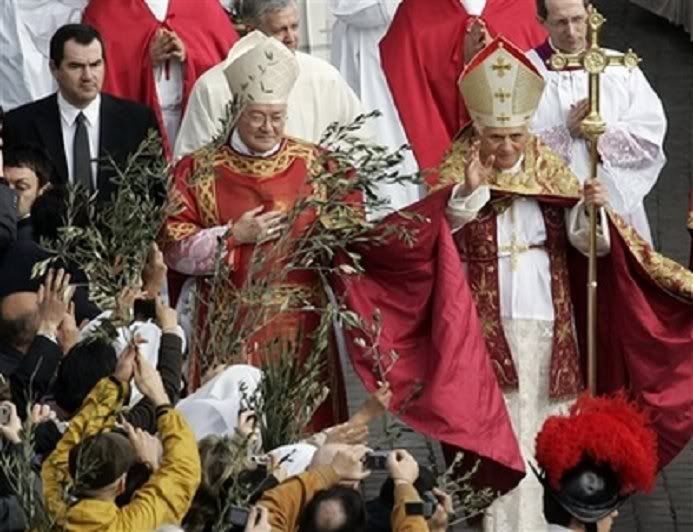
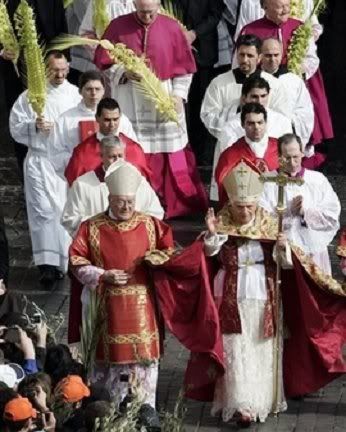 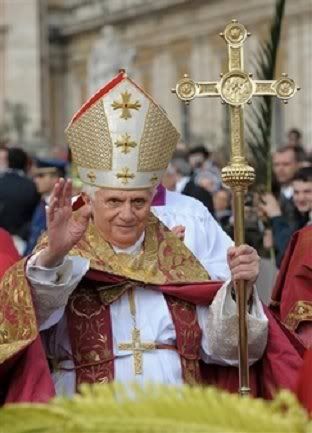
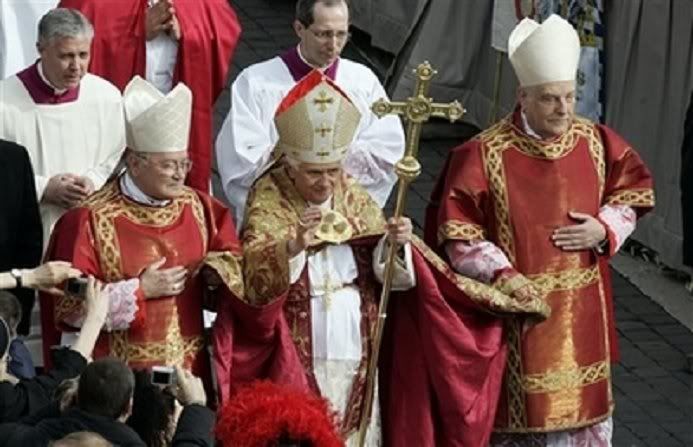 Pope says 'Enough killing in Iraq!'
Pope says 'Enough killing in Iraq!'
By NICOLE WINFIELD
VATICAN CITY, Mar. 16 (AP) - Pope Benedict XVI issued one of his strongest appeals for peace in Iraq on Sunday, days after the body of the kidnapped Chaldean Catholic archbishop was found near the northern city of Mosul.
The Pope also denounced the 5-year-long Iraq war, saying it had provoked the complete breakup of Iraqi civilian life.
"Enough with the slaughters. Enough with the violence. Enough with the hatred in Iraq!" Benedict said to applause at the end of his Palm Sunday Mass in St. Peter's Square.
On Thursday, the body of Archbishop Paulos Faraj Rahho was found near Mosul. He had been abducted on Feb. 29.
Benedict has called Rahho's death an "inhuman act of violence" that offended human dignity.
On Sunday, Benedict praised Rahho for his loyalty to Christ and his refusal to abandon his flock despite many threats and difficulties.
He recalled Rahho's death as the Catholic Church opens Holy Week, the most solemn week in the liturgical calendar in which the faithful recall the suffering and death of Jesus Christ.
Benedict said Rahho's dedication to the Catholic Church and his death compelled him to "raise a strong and sorrowful cry" to denounce the violence in Iraq spawned by the war that began five years ago this week.
"At the same time, I make an appeal to the Iraqi people, who for the past five years have borne the consequences of a war that provoked the breakup of their civil and social life," Benedict said.
He urged them to raise their heads and reconstruct their life through "reconciliation, forgiveness, justice and coexistence among tribal, ethnic and religious groups."
The Vatican strongly opposed the U.S.-led invasion of Iraq. In its aftermath, Benedict has frequently criticized attacks against Iraqi Christians by Islamic extremists. Last year, he urged President Bush to keep the safety of Iraqi Christians in mind.
Benedict is due to preside over a memorial service at the Vatican on Monday in honor of Rahho. Typically, the pope only presides over such services when a cardinal dies.
The pontiff's appeal for peace came at the end of his Palm Sunday Mass, which opens the Church's busy Holy Week celebrations. They include the Good Friday re-enactment of Christ's crucifixion and death and the celebration of Christ's resurrection on Easter Sunday.
At the start of Mass, Benedict blessed palms and olive branches with holy water and then processed through St. Peter's Square, wearing intricate, red- and gold-brocaded vestments and clutching a woven palm frond.
In his homily, Benedict urged the faithful to follow God with the innocence and purity of a child's heart.
"To recognize God, we must abandon the pride that dazzles us, that seeks to push us away from God," he said. To find God, he said, "we must learn to see with a young heart, one which isn't blocked by prejudice and dazzled by interests."
A few hundred young people carried massive palm fronds at the start of the procession through the square as part of the lead-up to celebrations for the Catholic Church's annual World Youth Day.
Benedict plans to attend World Youth Day in Sydney, Australia, in July.
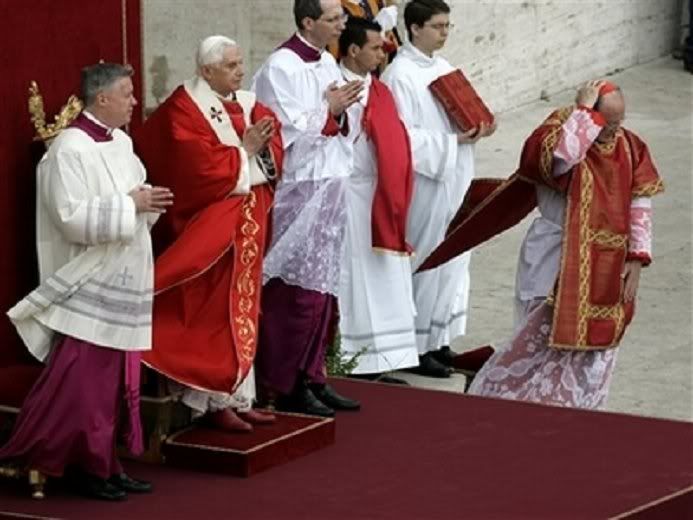
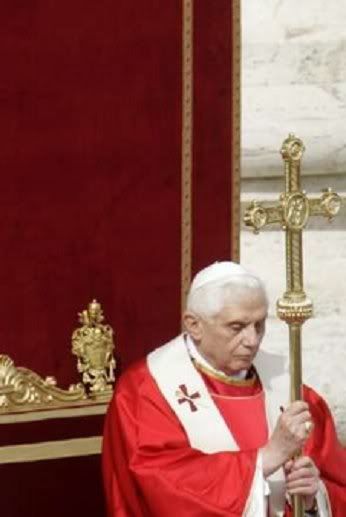 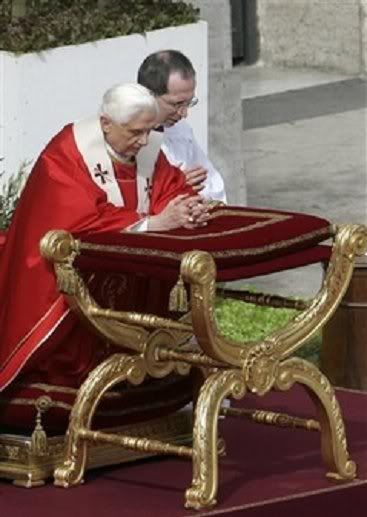
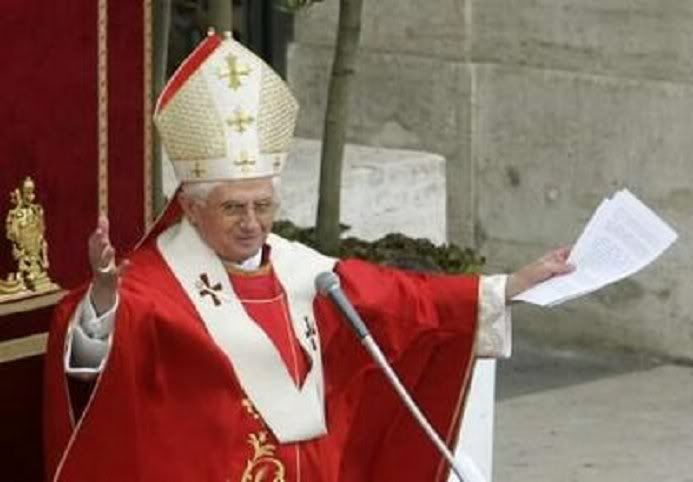
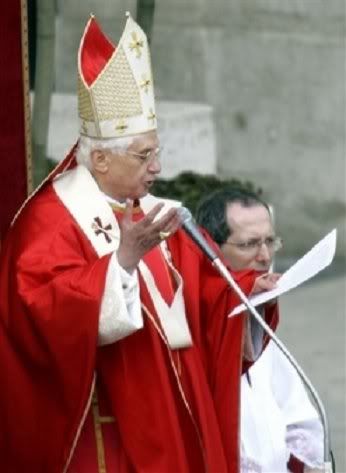 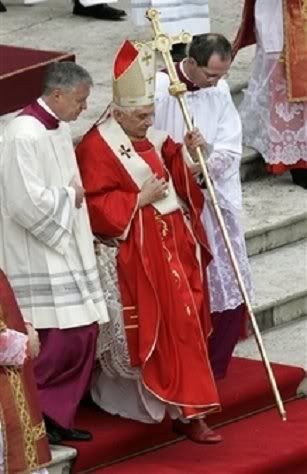 Pope makes strong appeal
Pope makes strong appeal
to end Iraq violence
VATICAN CITY, Mar. 16 (AFP) - Pope Benedict XVI made a strong heartfelt appeal for an end to the violence in Iraq, three days after the "tragic death" of the Chaldean Catholic Church archbishop of Mosul.
"Stop the massacres, the violence, the hatred in Iraq," the pontiff said during his weekly Angelus blessing to the crowds gathered in Saint Peter's Square as Catholics celebrated Palm Sunday and the start of holy week leading to Easter Sunday.
With the fifth anniversary this month of the US-led invasion of Iraq and the ensuing insurgency, the pope spoke of the Iraqi people "who for five years have faced the consequences of a war which has provoked the disintegration of civil and religious life," he said, urging the Iraqis to reconstruct their country.
The leader of the Roman Catholic Church also remembered Paulos Faraj Rahho, 65, an archbishop of the Chaldean Catholic sect in Iraq who was kidnapped two weeks ago and whose body was found Thursday in the outskirts of Mosul, about 370 kilometres (230 miles) north of Baghdad.
"He was an example of a beautiful dedication to Christ, the Church and his people who, despite numerous threats, he would not abandon," said the pope.
Rahho, 65, was kidnapped during a shootout in which three of his companions were killed, as he returned home after mass in Mosul on February 29.
His kidnappers telephoned church authorities on Thursday to announce that the archbishop had died and that they had buried him. His body was later exhumed and it was not yet known whether he died from natural causes or was killed as there were no bullet wounds to his body.
The US embassy in Baghdad and the American military blamed Al-Qaeda for the archbishop's death.
Iraq's Christians, with the Chaldean sect by far the largest community, were said to number as many as 800,000 before the 2003 invasion.
Associated with the "Crusader" invaders and regarded as well-off, they are now victims of sectarian cleansing, killings and kidnappings at the hands of both Sunni and Shiite Islamist extremists, as well as criminal gangs.
The Pope ended his public appearanee today with a Popemobile ride through the crowd at St. Peter's Square.
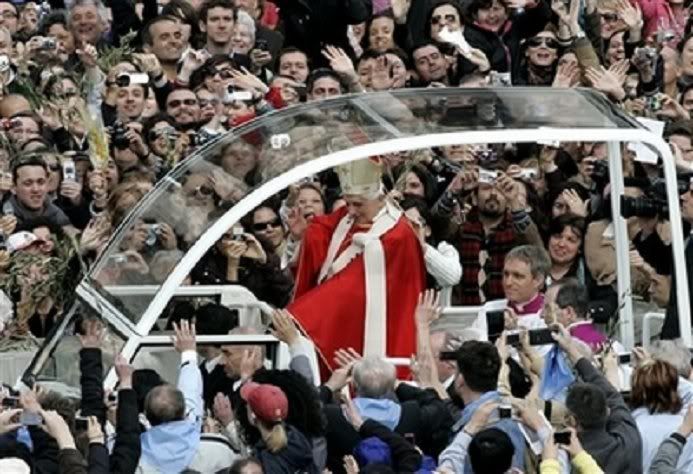



 NB: The Pope used a different pastoral staff today - a more traditional Cross rather than the stylized Crucifix he has been using (after JPII), and a new cope -
NB: The Pope used a different pastoral staff today - a more traditional Cross rather than the stylized Crucifix he has been using (after JPII), and a new cope -
the one pre-announced earlier as modelled after an inaugural vestment worn by the Medici Pope Leo V. The cardinal deacons were Cardinal Raffaele Martino, president of the Pontifical Council for Justice and Peace, and another cardinal whom I cannot identify by face.
P.S. In the time it took me to translate the homily, collate the pictures, enlarge and post them, I see Father Z was able to post a lot of video-caps on his blog, from which I will choose a few to round up the photo 'coverage' on this thread.
Of course, he noticed the different pastoral staff used today, and he identifies the second cardinal-deacon as Cardinal Zenon Grocholewski of the Congregation for Catholic Education.
PPS - Fr. Guy Selvester on his blog www.shoutsinthepiazza.blogspot.com/
has identified the pastoral staff [baculus pastoralis is the Latin term] topped by a Cross used by the Holy Father today as a historic one that was used by other Popes:
 
[Modificato da TERESA BENEDETTA 17/03/2008 12:23] |
 17/03/2008 12:52 17/03/2008 12:52 |
|
| | | OFFLINE | | Post: 12.418 | Registrato il: 28/08/2005
| Utente Gold | |
|
|
|
|
|
|